

Through your support in 2024, families found safety, warmth, and hope in the face of immense challenges. Thank you for choosing compassion. To learn more about how you made a difference in 2024, visit clwr.org.




Through your support in 2024, families found safety, warmth, and hope in the face of immense challenges. Thank you for choosing compassion. To learn more about how you made a difference in 2024, visit clwr.org.

The Canadian Lutheran is the national publication of Lutheran Church–Canada, published in Winnipeg six times per year: January/ February, March/April, May/June, July/August, September/October, November/December under the auspices of the Board of Directors (Communications and Technology Committee).
ISSN #0383-4247
Member: Canadian Christian Communicators Association
Editor: Mathew Block
Designer: Alex Steinke
Advertising: Angela Honey
Subscriptions: $30/yr
Or Buy-One-Gift-One: $50/yr
Email: a.honey@lutheranchurch.ca
All material and advertising should be in the office of The Canadian Lutheran five weeks prior to publication date. Advertising rate card available upon request.
The Canadian Lutheran 3074 Portage Ave. Winnipeg, MB R3K 0Y2 Telephone: 204-895-3433 FAX: 204-897-4319
Email: editor@lutheranchurch.ca
Materials published in The Canadian Lutheran, with the exception of Letters to the Editor, news reports, and advertising, receive doctrinal review and approval before publication. Contents of supplements are the responsibility of the organization purchasing the space.
©2025 Lutheran Church–Canada. Reproduction of a single article or column for parish use does not require the permission of The Canadian Lutheran. Such reproductions, however, should credit The Canadian Lutheran as the source.
Tel
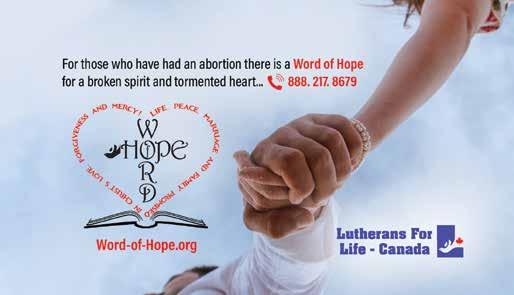





EDITOR | MATHEW BLOCK

“Oh, save Your people and bless Your heritage! Be their shepherd and carry them forever.” – Psalm 28:9
This is a passage of Scripture that I meditate upon frequently, but it has been especially in my mind recently as the result of recent deaths in our Lutheran Church–Canada (LCC) family. In December, Rev. Dr. Edwin Lehman—LCC’s first president, following the move to autonomy—was called to glory, as was former ABC District President Harold Ruf. They were preceded in mid-October by Rev. Dr. Roger J. Humann, the founding professor of Concordia Lutheran Theological Seminary (CLTS) in St. Catharines, Ontario, with another CLTS emeritus professor, Rev. Dr. John R. Wilch, called home in late November.
Add in last issue’s annual “In Memorium” section—in which we remember those LCC church workers who have died over the past year—and a certain measure of melancholy begins to set in. We rejoice that these faithful servants of Christ have been welcomed by Him into His eternal presence. But we also grieve what their loss in some ways represents: the passing of a foundational generation in our church’s life.
When LCC became autonomous in 1988, there was a sense that new and great things were just on the horizon. There was real joy—if also a little uncertainty—about what the future held. So it is that the Canadian church issued a proclamation to be read in all congregations during the first Sunday of 1989, “praising God for yesterday’s blessings and tomorrow’s opportunities.”
We have seen the realization of so many blessings over the past 37 years—in the great unity our synod family enjoys, for example, and in the expansion of our international missions. But fast-forward to today, and optimism about the future seems to be in shorter and shorter supply. Today LCC faces many challenges: membership decline, closing congregations, issues with pastoral recruitment, and churches without a full-time pastor. These can be disheartening things. But God does not abandon His heritage! He continues to care for us in the midst of trial and suffering. He has given us this great heritage; He will not forsake us. The truth of this promise is demonstrated again and again throughout Scripture. In the beginning, God established a good and perfect world. Mankind rebelled, however, and the world grew evil—so evil, in fact, that it needed to be washed clean. But God did not abandon the faithful remnant! He saved Noah and his family by means of the ark. Abraham’s offspring were
ultimately enslaved in Egypt. But God did not abandon His people! He defeated their oppressors and brought them up into a land of freedom. The city of Jerusalem was destroyed, and the survivors were taken into exile. But God did not forget His children! He sent the Persian king Cyrus to free the Jews, and allow them to return to Zion.
Scripture is full of these salvation stories—of God’s people up against it without any way to save themselves. But it isn’t just their stories: it’s our story too. For we also were up against it; though lovingly created by God, we all were born into the slavery of sin. But the Father did not abandon us! He sent us a Saviour, His own Son, Jesus Christ, to destroy the power of death and sin by dying on a cross. And through His resurrection, He won forgiveness and salvation for all who believe in Him. Now we are part of the family—the heritage!—of God, and have been given the right to be called His children (John 1:12).
“See what kind of love the Father has given to us, that we should be called children of God,” St. John marvels (1 John 3:1). And it really is a marvel: God loves us so much that He sent His own Son to die for us, in order that we would be made members of His family. How then can we doubt that He cares for us now in the midst of our current circumstances? We are His children. Our heritage is His heritage.
In this issue, we reflect anew on our “family history” as children of God. Our first feature reminds us why the history of the church—both local and global—matters for us today (page six). In our second feature, Rev. Dr. Richard A. Beinert reflects on the First Council of Nicaea in its 1,700th anniversary year (page nine). We include also a feature remembering the ministry of LCC’s first president, Edwin Lehman, now received into the arms of His Saviour (page 12). Finally, we note the release of new resources to help LCC congregations preserve their own local history for generations to come (page 22).
Lord Jesus, teach us to be grateful for all that You have done in ages past—for the heritage of faith which You have passed down to us through the saints who have gone before us. May we learn from their examples, with the aid of Your Holy Spirit. May we follow in their footsteps, in faithfulness to You and to Your Word. Oh, Lord, save Your people and bless Your heritage! Be our shepherd, and carry us forever. Amen.
Many years ago, I was reading the story of the martyrdom of Polycarp, an early Christian bishop who was arrested in his old age. Asked to recant his faith in Christ under threat of death, Polycarp replied: “Eighty-six years have I served Him, and He never did me any harm: how then can I blaspheme my King and Saviour?” It was a beautiful declaration of faith.
Polycarp, of course, dies at the end of the story, and the document concludes with an encouragement to readers to follow Polycarp’s example of faith. Or rather, it almost ends that way: the edition I was reading also includes a postscript of sorts. “These things Caius transcribed from the copy of Irenaeus,” one writer says. “I Socrates transcribed them at Corinth from the copy of Caius,” another adds. And one final scribe, Pionius, concludes: “I have collected these things, when they had almost faded away through the lapse of time, that the Lord Jesus Christ may also gather me along with His elect into His heavenly kingdom—to whom, with the Father and the Holy Spirit, be glory for ever and ever. Amen.”
These words made me think seriously for the first time about the process of how the stories of the past make their way down into the present—about the people who have preserved those stories and events for us today. It is certainly edifying, as the story of Polycarp reminds us, to reflect on the saints who have gone before us and imitate their faith. But without faithful scribes like Caius and Socrates and Pionius to pass on such stories, they might indeed “fade away through the lapse of time.”
The story of history is ultimately the story of God’s providential care for His people in all times and all circumstances. But what we sometimes forget is that the preservation of that story has also been accomplished through God’s providential care, God working through
by Mathew
everyday human beings. Without the work of countless scholars and scribes down through the ages, these stories might eventually be forgotten. Such people “copie fair what time hath blurr’d,” as the great English poet George Herbert wrote, and “redeem truth from his jawes.” In other words, these human beings are the instruments, the means by which God blesses us in the present with the riches of the past.
In a sense, this isn’t surprising: this is how all communication works. If there is a message to be delivered, then there also has to be someone to deliver that message. Think, for example, of how the good news of Jesus’ death and resurrection for the forgiveness of sins is shared with people. How, St. Paul asks, are people supposed to believe in Jesus unless someone is first sent to preach Jesus to them (Romans 10:14-15)? And the good news that we receive from those messengers, we turn around and pass on to others (cf. 1 Corinthians 15:3). That transmission—that embracing of what we have heard and believed, and then telling others too—is at the heart of Christian evangelism. The same model of communication also applies to the broader task of sharing the story of God’s work across history.
When we thank God in our prayers for our daily bread, we are thanking Him not only for the food in front of us; we are also thanking Him by extension for all those whose labour produced that food and brought it to our tables. In the same way, it can be a healthy practice to thank God not only for His blessings in the past but also for those scribes and scholars who preserved that history for us. Most of these people, of course, we do not know—although some (like Pionius above) we know through their “colophons” or comments at the end of a text. When there is a colophon at the end of these old manuscripts, they often include a prayer that God would remember the scribe, and that those
Tell your children of it, and let your children tell their children, and their children to another generation.
—
readers who benefit from his work would also remember the author in prayer.
When you are edified or learn something from a book, it’s good to thank God for the good he has brought you through the author. But don’t stop just with authors. Remember everyone they relied on for information. Remember the chroniclers who kept careful record of historical events. Remember the monks and scribes who ensured copies of this knowledge and wisdom would come down to you in the present. Remember the translators who bring you that knowledge in a language you can understand. Remember archivists and librarians, archaeologists and historians, publishers and proofreaders who have made it possible for you to read all the things we can read today.
But don’t stop there either! Remember the farmers who grew the food which fed the authors and scribes. Remember the loggers who cut down trees, and the workers who turned them into paper. Remember the computer programmers who made the software used in modern publishing, and the electricians who make it possible to even turn the computers on. Remember the teachers who taught you to read, and the lens-makers who made your reading glasses. Remember the pastors who still bring you God’s story today, and the congregants who finance that ministry with their gifts and offerings. Remember them all—and thank God for them!
That anything—any scrap of knowledge and wisdom— should make its way down from the past into the present to you is a miracle. How many things had to work in concert to ensure its survival? How many things could have stopped it in its tracks? And yet God in His kindness has allowed the story of His people to be remembered, so that we too can learn and be edified by it today.
God also invites us to be part of sharing that story with future generations. Of His laws, He says: “You shall teach them diligently to your children” (Deuteronomy 6:7). Of His judgement, He says: “Tell your children of it, and let your children tell their children, and their children to another generation” (Joel 1:3). How much more are we to share the good news of His acts of mercy! “We will not hide them from [our] children,” the Psalmist writes, “but tell to the coming generation the glorious deeds of the LORD, and His might, and the wonders that He has done” (Psalm 78:4). Why? “So that they should set their hope in God and not forget the works of God, but keep His commandments” (78:7).
When we think of history in a Christian sense, it’s natural to think of the big events and people first. We think
—
of Old Testament history—about Moses and Pharoah, and the salvation of the Jews out of Egypt. We think of New Testament history—the death and resurrection of Jesus for our salvation, and the spread of the infant Church under the Apostles. We might also think of Church history—the councils that led to the Nicene Creed, for example, and Martin Luther and the Reformation.
While it’s both natural and good to reflect on the big events, your reflections shouldn’t end there. Celebrate your church’s local history too—the individuals and events which have led to your own part in the story of God’s people. Do as the author of Hebrews encourages you, and “remember your leaders, those who spoke to you the Word of God. Consider the outcome of their way of life, and imitate their faith” (Hebrews 13:7). Do as St. Paul encouraged St. Timothy, and reflect on “the faith that dwelt first in your grandmother… and your mother” and which now “dwells in you as well” (2 Timothy 1:5). Do as the Fourth Commandment bids you: “Honour your father and your mother” (Exodus 20:12, Deuteronomy 5:16). Rejoice in the stories of those who have gone before you, and seek to follow in their footsteps.
And don’t only look backward. What you have received, pass on to others! Consider volunteering to help maintain your congregation’s archives, so that the testimony of God’s work in your own church is recorded for generations to come. Tell your friends about the salvation Jesus has won for you and for them. Write a letter to your children telling them how Jesus has carried you through difficult times. Share the story of Scripture and your own story of faith!
Be, in other words, the link, the means by which God continues to bring the blessings of the past into the present. For the story of God’s people—the history of His Church— is ultimately the story of Christ. In Him, past meets present, and present meets future—for Jesus is “the same yesterday and today and forever” (Hebrews 13:8). He is “the Alpha and the Omega, the first and the last, the beginning and the end” (Revelation 22:13). To Him, then, “the King of the ages, immortal, invisible, the only God, be honour and glory forever and ever. Amen” (1 Timothy 1:17).
* *
Mathew Block is editor of The Canadian Lutheran and communications manager of the International Lutheran Council.

REFLECTING ON OUR FAITH 1700 YEARS AFTER THE FIRST COUNCIL OF NICAEA
by Richard A. Beinert
This year, we celebrate a milestone within Christian history: the 1700th anniversary of the First Council of Nicaea. I’m going to guess that many of you reading this will respond with a puzzled look and the question: “The First Council of what?” Some of you might pick up on the similarity between the name “Nicaea” and the Nicene Creed which bears its name—but beyond that, this event from the history of our Church is often not talked about as often as it should be.

This First Council of Nicaea, which met between May and August of the year 325 A.D., marked an important watershed in the history of both the Church and of Western civilization. In the centuries between the time of the New Testament and the early 300s, Christianity existed as a persecuted religious movement where martyrdom was not uncommon, since both Caesar and Synagogue would make Christians the common scapegoat for any social and cultural problems that arose. But when Constantine became Emperor in 306 A.D., he took steps to have Christianity declared a legal religious community throughout the Roman Empire with his Edict of Milan in 313. Having converted to Christianity himself, he convened a universal Council of the Church in the city of Nicaea (modern day Iznik in Turkey) in order to address structural and doctrinal issues that had arisen within the Christian world during the second and third centuries— some of which were threatening to tear the Christian community apart.
The Council saw somewhere between 250 and 318 bishops attend from across the Christian Church. The vast majority were bishops from the eastern parts of the Roman Empire (Turkey, Egypt, and Palestine), although there were also five that came from the West. One of them, Hosius of Cordoba (256-359), presided over the discussions; but beyond that, representation from the Roman part of the Church was largely absent as the bishops gathered to wade through the weighty doctrinal and practical issues that the Christian church was facing at the time.
One of the key issues that needed to be discussed was the oversight and supervision of the Christian Church throughout the Empire. Following ancient tradition, four key bishops were recognized as holding oversight over various regions of the Church. These included Jerusalem and Antioch (in Syria), ancient cities where Christianity had its beginnings. The other two were Rome and Alexandria (in Egypt), due to their status as the first and second Imperial capitals of the Ancient Roman world. Each was to be honoured in their respective regions as holding a position of oversight, both to avoid political
(and doctrinal) clashes between bishops but also as a way to create order for the expanding mission of the Church into new territories. The bigger doctrinal issue that the Church needed to address was the manner in which the doctrine of the Trinity as well as the divinity of Christ was best confessed within a world where neither fit neatly into the philosophical worldviews of the day.
A prominent figure in all this was a fellow by the name of Arius (250-336 A.D.), a priest from Alexandria in Egypt who tried to grapple with the question: “Who is Jesus?” St. John of course says that Jesus is the Word (John 1:1). But what does that really mean? Relying on the Neo-Platonist philosophy of his day, Arius argued that the whole idea of Jesus being the “Word” must imply that He is somehow lesser than God the Father (because that’s how Plato’s conception of the ‘Word’ fit into his worldview). But Arius took it one step further, arguing that not only was Jesus lesser than the Father, He wasn’t God at all but just a creature—perhaps the first creation of God, but still a creation nonetheless.
All of this contradicts the Bible, of course, in which Jesus is called “Immanuel” (which means “God-with-us”) and where He is consistently identified as the Lord— Yahweh—in the flesh. This is clear from Old Testament prophecies pointing to Him, and even in Jesus’ own words where He says, “Before Abraham was, I Am” (John 8:58). Here Jesus takes the very name of Yahweh—“I Am”— from the burning bush (Exodus 3:14) into His mouth and claims it as His very own!
In contradiction to all this, Arius argued that Jesus was essentially ‘different’ from the Father. It was an idea that tore at the very fabric of biblical teaching and the way in which the Church had taught the saving work of Christ from its very beginning.
Enter St. Athanasius (296-373 A.D.), also an Egyptian and the bishop of Alexandria. Athanasius combed through the Scriptures and the writings of the earlier Fathers of the Church, demonstrating that Arius’ views were Scripturally inaccurate and that his views also presented a serious challenge to the way in which the Bible speaks about the saving activity of Jesus Christ. Jesus needed to be

both fully human and fully divine in order to be both the acceptable offering that takes away the sins of the world (John 1:29) as well as the one who allows us to become “partakers of the divine nature” (2 Peter 1:4).
At the First Council of Nicaea, this issue was further clarified. The bishops introduced a new term—not used in the Scriptures but which captures the essence of biblical teaching—– that Jesus was (and is) homoousios (“of one substance”) with the Father in His divinity. That’s something we still confess in the Nicene Creed today.
The Nicene Creed was adapted from an earlier baptismal creed, which was used in areas of modern-day Palestine and which Eusebius of Caesarea (260-339 A.D.) had introduced to the Council of Nicaea. The Council expanded the second article of this baptismal creed in order to better anchor this confession of Jesus-as-Saviour as both fully human and divine— in opposition to Arius’ incomplete teachings.
While the Creed that came out of the Council was not the full Nicene Creed as we know and use it today, it provided the foundation for the fuller expression and confession of the ancient biblical faith during a time when cultural pressures and philosophies threatened to unravel it. It took the second Ecumenical Council of the ancient Church (the First Council of Constantinople in 381 A.D.) to fill out the Nicene Creed—expanding especially the third article dealing with the Holy Spirit—to lay the foundation as the common confession of the Church that we still subscribe to today. The Nicene Creed that had its beginnings at the First Council of Nicaea 1700 years ago this year forms part of our public confession of faith. It is included in the Book of Concord, to which our pastors and congregations today still commit themselves as preachers and teachers and believers of the Gospel.
Saviour (in the fullness of all that means). We don’t do that by taking these key moments of history for granted.
As we celebrate this anniversary, it is an opportunity to pause and reflect upon our own lives of faith, and to ask ourselves: are we simply seeking the Jesus that we like, based on cultural fads? Or are we pursuing the Jesus of Scripture, who is in His very person the theanthropos (the “God-Man”)? As that “God-Man,” Jesus is the very bridge by which our Triune God’s eternal life enters into our world today, through His very humanity—His flesh and blood.
That same flesh and blood are offered to us in the Blessed Sacrament of the Altar. So when we receive the Body and Blood of our Saviour in the Sacrament, we also receive the very Second Person of the Holy Trinity. We receive into ourselves the very Lord of Life, all for us and for our salvation (John 6:53-58), who is God of God, Light of Light, very God of very God, begotten not made—so that we can be fed with His very own Eternal

AS THAT “GOD-MAN,” JESUS IS THE VERY BRIDGE BY WHICH OUR TRIUNE GOD’S ETERNAL LIFE ENTERS INTO OUR WORLD TODAY, THROUGH HIS VERY HUMANITY—HIS FLESH AND BLOOD.
THAT SAME FLESH AND BLOOD ARE OFFERED TO US IN THE BLESSED SACRAMENT OF THE ALTAR.
The Nicene Creed and the history which surrounded its origins still have much to teach us today. We still live in a world where culture and philosophy tease us to abandon or cheapen the richness of the biblical Gospel. We see this throughout the world—even here in Canada—as many denominations which historically held to strong Christian beliefs abandon them in favour of cultural ideologies and social movements, because—they say—“that’s where people are at today.” Instead, we need to take the time to slow down and tarry at the manger and the cross in order to really embrace the fullness of this Jesus whom we—together with the ancient Church—confess to be
Life as branches grafted (baptized) into Christ the Vine (John 15).
Anything less than that full confession of His full humanity and His full divinity misrepresents the faith that the Scriptures teach, and so jeopardizes our living within that wondrous Gift of Salvation.
I invite you all to ponder anew this Gift as we confess our faith using the words of the Nicene Creed, building upon that great cloud of witnesses who have gone before us (Hebrews 11), pursuing Jesus as the God-Man who invites us to enter into the very presence of God through the very means of the Sacrament of His Body and Blood (Hebrews 11:19-25)—building our lives upon Christ, our Saviour, the very Rock of our Salvation.
REV. DR. RICHARD A. BEINERT is pastor of Saint James Lutheran Church in Winnipeg.
Rev. Dr. Edwin Lehman, President Emeritus of Lutheran Church–Canada (LCC), was called to glory during the morning of December 5, 2024. He was 92 years old.
Dr. Lehman was the first synodical president of Lutheran Church–Canada, elected to lead the newly-autonomous church during its founding convention in 1988. He was reelected as president in 1990 and again in 1993. Dr. Lehman continued as president until his retirement in 1996, when he declined to stand for reelection.
This was a critical period in the development of Lutheran Church–Canada. During President Lehman’s tenure, LCC took its first steps as an autonomous church body; established its national synodical office in Winnipeg; developed missions in Thailand and Ukraine (places where LCC is still active today); entered into fellowship with partner churches in several countries around the world; and initiated conversations that would eventually lead to the establishment of the diaconate in LCC.
Dr. Lehman later reflected on his time as president in the 2022 book Missouri North: The History of Lutheran Church–Canada “God had been good to us—far better than we deserved,” Dr. Lehman wrote in his contribution to the book. “God had blessed us with a strong sense of unity. He had opened doors of opportunity, bringing the Gospel to lands we would not have entered had we not been autonomous. We were training our pastors and lay leaders, with two excellent seminaries and a college.”
“Not surprisingly, some of our good intentions did not materialize,” Dr. Lehman continued. “But a new day was dawning…. God had used us as His instrument, and there would be much more to come.”
Prior to becoming president of Lutheran Church–Canada, Dr. Lehman served from 1978-1988 as District President of the AlbertaBritish Columbia District (then still part of The Lutheran Church— Missouri Synod). His tenure as district president saw the founding


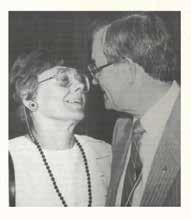


of Concordia Lutheran Seminary (CLS) in Edmonton. He earlier served the district as First Vice-President and as Chairman of the Mission Department.
Dr. Lehman served as a pastor of congregations in Richmond, B.C. (1967-1978); Red Deer, Alberta (19581967); and Wadena, Saskatchewan (1956-1958).
Following his time as LCC President, Dr. Lehman continued to serve the Canadian church in many ways, including two periods as Interim President of Concordia Lutheran Seminary in Edmonton as well as service on the governing board of Concordia Lutheran Mission Society.
In addition to serving the Canadian church, Dr. Lehman held important leadership roles in global Lutheranism. He was elected Chairman of the International Lutheran Conference (ILC) in 1991 and given the task—alongside the ILC’s Vice Chairman, Bishop Jobst Schöne of Germany—of elevating the ILC from a conference to a formal council of confessional Lutheran church bodies. The constitution of this reorganized International Lutheran Council was adopted at the 1993 ILC World Conference, at which time Dr. Lehman was also elected to a second term as Chairman.
During this second term, the ILC’s executive committee founded a newsletter, appointing Dr. Lehman as the editor of ILC News. Following the completion of his service as Chairman in 1995, Dr. Lehman continued to serve the ILC as news editor until 1998.
Dr. Lehman was predeceased by his wife Marjorie in 2015.
Lutheran Church–Canada’s current president, Rev. Dr. Timothy Teuscher, expressed the thankfulness of the entire church for the life and ministry of President Emeritus Lehman. “Although small in stature, Ed not only cast a large shadow over Lutheran Church–Canada, but also over worldwide confessional Lutheranism,” he noted. “Upon my election to this office of President of LCC in 2017 and in the years since, I have cherished his many kind words of support and encouragement.”
A funeral for Dr. Lehman took place on December 20 at Concordia Lutheran Church in Edmonton. The service was
also broadcast online. Preaching for the funeral was LCC’s Past President Robert Bugbee, as President Teuscher was recovering from surgery at the time.
Past President Bugbee noted that, in addition to the personal grief felt by Dr. Lehman’s family, “it’s an emotional moment also for the entire Lutheran Church –Canada family across the land, which bids farewell today to its irreplaceable first synodical president.”
“If I were to start reciting things that Ed Lehman said and did to help us as a group and as individuals in our life of faith, it would get wearying in very short order because there are so many,” Dr. Bugbee said. “And even then, it would be a very abbreviated list.”
But that’s not what President Emeritus Lehman wanted. In fact, as Dr. Bugbee noted, President Emeritus Lehman had planned in advance what he wanted at his funeral, including the Gospel text and the sermon theme.
“In lifting out this particular word of Scripture, he was pointing to the heart of what sorrowing Christians need to know upon funeral day,” Dr. Bugbee said. “And these words shine the spotlight on what really matters for an occasion like this: and they point to Jesus, not quite so much to Edwin Lehman—which would have been quite fine with him.”
That Gospel text was John 5:24—“‘I tell you the truth,’ said Jesus, ‘whoever hears My Word and believes Him who sent Me has eternal life and will not be condemned. He has passed from death to life.’”
It was this Good News for people in the here and now that President Emeritus Lehman was privileged to bear witness to throughout his ministry. It was this Good News that Past President Bugbee preached at Dr. Lehman’s funeral in his stead. And it is this Good News which comforts LCC members across the country, as they remember the life and witness to Jesus Christ of Edwin Lehman.
In lieu of flowers, the family of Edwin Lehman encouraged memorial donations be made to Concordia Lutheran Mission Society or Concordia Lutheran Seminary in Edmonton.

In 2024, Lutheran Church–Canada (LCC)’s BOD met regularly in person and online. Highlights include:
At the recommendation of the International Missions Committee (IMC), the BOD approved the establishment of a formal relationship with the Evangelical Lutheran Church of Haiti (ÉÉLH) to support the Haitian church’s need for theological education (see The Canadian Lutheran - March/April 2024 page 32).
Rev. Jacob Quast was called to and accepted the position of Director of Domestic Missions. This position was highlighted as a priority at LCC’s 2022 Synod Convention (For additional information on Rev. Quast, see The Canadian Lutheran - March/April 2024 page 18 and May/June 2024 page 31).
The BOD approved the printing of a devotional book for the Canadian Armed Forces. The request from LCC’s Military Dean, Rev. Don Schiemann, highlighted the need for materials for LCC pastors serving as chaplains. There are currently thirteen LCC pastors serving as Regular Forces or Reserve chaplains. The book is in the final stages of review before publication.
LCC’s Annual Meeting of Members (AGM) took place online on June 13, 2024. The 2024 LCC Annual Report was presented as part of the meeting docket (see The Canadian Lutheran - July/August 2024 page 17 for the full story and details on how to download a digital copy of the Annual Report).
The BOD was pleased to issue a call on behalf of the congregations of LCC to Rev. Megersa Denu to serve as Missionary-at-Large to the Oromo communities in the Lower Mainland of British Columbia (see The Canadian Lutheran - May/June 2024 page 35).
Throughout 2024, the BOD received action updates on the Synod’s Strategic Initiatives. Arising from the planning process that began in 2022, these initiatives are helping prioritize the issues that are most critical to directing, strengthening, and sustaining LCC’s overall mission and ministry (see The Canadian Lutheran - January/February 2023 page 19, January/February 2024 page 14, and pages 16-17 in this issue).
LCC’s 13 th Regular Convention will be held at the Victoria Inn Hotel and Convention Centre in Winnipeg from June 12-15, 2026, gathering under the theme “Together One: One Lord, One Faith, One Body” with its theme verse being Ephesians 4:4-6.
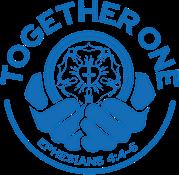
The start of business related to this synod convention will begin on March 20, 2025, with the first meeting of the Commission on Nominations and Elections (CNE). The CNE manages the nomination
process for elected positions at the synodical and regional levels, monitors the vetting process of nominees, and supervises the election of candidates to various positions at conventions of LCC.
The CNE’s members are: Rhonda Kelman, BC; Rod Johnson, ON; Liz Schieman, AB; Reg Tiegs, ON; Dcn. Kathy Cornish, AB; Rev. Dr. Richard Beinert, MB (replacing Rev. Keith Hoveland); Rev. Kurt Lantz, ON; and Rev. Phil Washeim, BC.
A new convention webpage has been established under “Events” on LCC’s website. News pertaining to LCC’s Synod Convention will be released on an ongoing basis in The Canadian Lutheran, on CanadianLutheran.ca, and in InfoDigest.

Interviews for the position of Associate Director – Family Ministries, which arose as a result of Resolution 22.3.03a at the 2022 LCC convention, have been conducted. An announcement of the successful candidate is expected in Spring 2025.
The 2025 Church Worker Compensation Guidelines were released for use by congregations. The committee reviews the guidelines on an annual basis to consider cost of living changes and other financial factors such as housing.
The Archives Committee continues to pursue two tracks:
• To provide materials to congregations for records management and archives preparation (see page 22 this issue);
• To explore options for the collection and retention of the records of LCC and her congregations.
The BOD approved the committee ’s proposal to undertake discussions with the East District Corporation Board regarding the transfer of ownership of the Malinsky (East District) Archives to LCC.
Additionally, the board approved the committee’s recommendation to establish three archival administrative zones to receive archival material from congregations across LCC. The committee will now move ahead with a plan for implementation.
A search for an event management app for the 2026 Convention has started. The use of an app in 2022 was well received and allowed delegates to communicate among themselves; receive timely updates to the convention schedule and documents; and highlighted exhibitors and sponsors.
Alex Steinke, LCC’s Director of Communications, has returned to work from maternity leave as of January 1, 2025.
The BOD’s governance self-evaluation process was reviewed and recommendations submitted to the Board for implementation. Development continues on an annual work plan for each board committee to help coordinate the work of the committees. Also in development is a plan for orienting committees on their role at the beginning of each term.
Memorandum of Understanding (MOU) consultant Rev. Nolan Astley continued work developing relationship documents with LCC’s listed service organizations (LSOs). The Lutheran Association of Missionaries and Pilots (LAMP) completed a memorandum of understanding (MOU) in 2024. To date, 11 MOUs have been completed and two more are in progress, helping to define relationships between entities in the synodical family.
The three Regional Mission and Ministry Councils (RMMCs) continued to meet regularly during 2024. Each RMMC assists their Regional Pastor by participating in:
• Mission and ministry planning;
• Support, and caring for congregations, pastors, and deacons in their respective region;
• Working with LCC’s Director of Advancement to engage and encourage congregations to support the mission and ministry of our synod;
• Consulting with LCC’s Chief Administrative Officer (CAO) in delivering financial support to missions and ministries in their region.
The Central RMMC met in February and September 2024. February’s meeting focused on updates from each circuit. The September meeting had the dual focus of reviewing financial assistance requests and receiving synod updates from David Friesen, Director of Advancement, and Rev. Jacob Quast, Director of Domestic Missions.
The East RMMC met in September 2024 over two days, reviewing financial assistance requests, and receiving a synod update from Rev. Jacob Quast. The RMMC’s subcommittees in the areas of domestic missions, congregational cooperation, parish services, finance, and communications also met and then reported updates and actions in their specific areas.
The West RMMC met in April in-person and online in September 2024. At the April meeting in Edmonton, the RMMC was blessed with two presentations, the first by Concordia Lutheran Seminary (CLS) Interim President, Rev. Dr. Joel Heck, entitled, “The Art of Asking Questions.” The second was by Rev. Neil Stern (pastor, Englishspeaking members), Rev. James Kay (pastor, Nuer-speaking members), and congregation chair David Dyck on the two cultures worshiping together at Grace Lutheran Church (Edmonton). Rev. Mark Smith, Director of International Missions, and David Friesen provided synod updates, and there was also time for discussion on the developing role of the RMMCs in Synod’s structure. In September, the RMMC focused on reviewing financial assistance requests.
Additional information about RMMCs can be found at Lutheranchurchcanada.ca/missions/rmmc.
The Purpose and Priorities Planning Process developed major goals and strategic initiatives focused on key areas of need, as defined by our members. The result was a shared vision for the future of our church body—to direct, strengthen, and sustain our mission and ministry today and into the future. This plan also provides a foundation for future development programs and funding initiatives.
Like all strategic plans, the initiatives are a work-in-progress. During 2024, some of the initiatives were completed and others have just begun (see table below). To provide input in any of these areas, please contact David Friesen, LCC’s Director of Advancement.
Develop congregational assessment and revitalization process to assist congregations at varying stages of development.
Provide an ongoing series of education seminars for professional theological development.
Work with congregations to identify and develop approaches to mission outreach in their area.
Strengthen relationships between Director of Missions and partner ministries to build strong, coordinated outreach to Indigenous and underserved urban communities.
Congregations have been utilizing an assessment tool to measure three critical elements of congregational well-being: sustainability, adaptability, and balance of outward-inward focus. There are a few different paths that congregations can follow once they have completed this first step, including a focus on evangelism, mission outreach, or strategic planning.
The President’s Ministry Council (PMC) is working with pastors and seminaries to identify areas of need and develop seminars.
LCC’s three RMMCs continued to meet regularly during 2024 to review financial assistance requests; to receive various mission and ministry updates; and for planning, as the role of RMMCs continues to develop in our synodical structure.
A draft framework has been developed for Indigenous outreach and collaborative work is ongoing with partner ministries, Indigenous communities, local congregations, and the LCMS. Work is also continuing in the area of language ministry and evangelism in significant urban areas.
Call a Director of Domestic Missions. This is now completed.
Identify the top three underserved immigrant groups in areas where LCC has an existing congregation for possible mission expansion.
Promote opportunities for partnership with individuals to support specific missions.
Identify three prospective mission fields for Indigenous ministry.
Current areas of focus are on Chinese ministry in the lower mainland of B.C., Oromo ministry in various locations across the country, and outreach to the Muslim community in southern Ontario.
Engagement of individual donors is ongoing through the Director of Advancement and the Directors of Missions. Work is underway updating the Mission pages on LCC’s website to better reflect opportunities for support.
A joint meeting with BC Mission Boat Society, LAMP, the LCMS, and LCC leadership took place in September. Work is underway in Kitimat Village through Rev. Daniel Cunningham. Planning is underway for our Director of Domestic Missions to visit a few of the First Nations communities where BCMBS has already developed long-standing relationships.
Launch monthly Zoom calls on current, important topics, to be led by an expert chosen by Synod leadership, which are open and available to anybody within LCC in which to participate.
Develop new protocols within the Pastors with Alternate Training (PAT) program to train up pastors for unique, small congregation circumstances.
Define the role of Associate Director - Family Ministry* so that one can be called. *title change from Director of Young Adult and Youth Ministry
The PMC recognizes the need for lifelong education and formation for all church workers, and has begun working with the seminaries to develop a more comprehensive approach to this. These seminars will be a part of that comprehensive approach.
The Boards of Regents of both seminaries, in collaboration with the PMC are in the final planning stages of a multi-level extension of the existing PAT program as well as training and resources for lay leaders in congregations with an indefinite period of vacancy.
The scope of Role and Job Description were completed and BOD approved. After a call to the church at large for nominations, six candidates were interviewed. A call for the position is expected in spring 2025.
Implement a formal assessment of the RMMC model for regional mission engagement to best optimize its impact.
Identify key areas of synodical staffing needs and develop a staffing plan (to better serve congregations and members).
Develop clear job descriptions and succession plans for all synodical positions.
Create a calendar of national events and activities to strengthen unity and intercongregational relationships.
Each RMMC has been active in clarifying roles and responsibilities within their regions. Working groups across all regions are connecting together to share ideas. Representatives from each RMMC work with LCC leadership and the Director of Domestic Missions to determine the best use of resources. LCC’s Director of Advancement is also working with RMMCs to increase domestic mission support.
Once the Associate Director of Family Ministries is hired, LCC staffing levels will be aligned with current needs. Additional staffing needs required for upcoming initiatives continue to be reviewed.
The personnel committee continues to review job descriptions with a focus on succession planning for key positions.
A review of web-based platforms to determine the best way to share event/activity information is ongoing. Discussion on type of events is in progress. A list of current and potential events and activities is being produced for review, within a broader strategic communications plan that is in development.
Coincide Annual General Meeting with release of Annual Report, ensuring timely, accurate, and transparent information is being released from the previous fiscal year.
Initiate the Campaign Readiness Study to determine the timing and scope of a national comprehensive campaign in support of current and future Synodical missions.
Develop and implement a synod-wide approach to encourage, engage, and increase congregational remittances.
Develop improved procedures to allocate and distribute financial resources to support domestic missions (and ministry).
The AGM was held on June 13, 2024. The inaugural Annual Report was developed and made available for the AGM. It was also distributed to each congregation in September. Convention delegates were provided with speaking notes to share highlights with their congregation. Next year we will target to send the Annual Report out before the end of June.
The Campaign Readiness Study was carried out between February 2024 and November 2024. It included the development of a preliminary Case Statement that was tested with a number of LCC members. The findings and recommendations of this study were presented at the LCC BOD meeting in October.
Significant work continues on this comprehensive initiative involving the Director of Advancement, Regional Pastors, RMMCs, and most importantly, congregations. Emphasis is placed on communicating with congregation leaders utilizing in-person presentations, printed material, and current financial needs. Further development of an annual giving program is in progress.
LCC’s CAO continues to provide enhanced congregation analytics to assist RMMCs in making informed decisions on allocating financial resources.
Identify at least one lay representative from each congregation to receive all communications from the national office.
Create an annual communications and direct mail calendar designed to engage congregations, laity, pastors, and church workers.
Create annual report on mission needs and congregational remittances to increase awareness and response to support mission and ministry.
LCC is connecting with convention lay delegates (or their alternates) to disseminate national information. There are two significant communications each year that we request delegates share and promote within their congregation: The Standard and the Annual Report.
Defining the various communication items and timeframes is ongoing. This includes print, web, and other electronic media. A review of web-based platforms to determine the best way to share event/activity information is ongoing. A strategic communications plan is in development to identify priorities for the department, as well as establish communication methods and platforms that will impactfully serve LCC and its members.
LCC’s Directors of Missions and Director of Advancement, in coordination with the CAO, are actively defining, developing, and delivering information needed by congregations to assist in their process of budgeting and support of LCC’s mission and ministry.
ACTION ON CONVENTION RESOLUTIONS - Resolution 22.3.08a To Direct the Synod Board of Directors to Revisit Resolution 17.2.01 (Vicarage Placement Fund). Financial support for vicarage placement has been approved for inclusion in the allocated goals of the Together One campaign.
The church in convention, through the adoption of LCC’s Strategic Priorities and resolutions that were put forward, expressed overwhelming support to expand LCC’s mission and ministry of spreading God’s Word and supporting members. Based on the LCC Workplan for Fiscal Year 2025 (part of the Quadrennial Workplan) presented and adopted at the Synodical Convention in 2022, the following chart and table show the actual FY2025 budget approved by LCC’s Board of Directors in March 2024.
FY2025 runs from February 1, 2024 to January 31, 2025. This budget covers all aspects of the work of Lutheran Church–Canada. The FY2025 LCC Budget has a total mission and ministry expenditure of $4.152 million dollars.
Each of the pie pieces represents a unique part of LCC’s mission and ministry. The two inner circles represent those services that share their costs across all mission and ministry areas. Common Services include administration, human resources, office fixed costs, Board of Directors, investment fees, governance, and miscellaneous costs. Advancement Services reflect all costs associated with the development of financial resources across all areas and congregation services related to LCC’s support of Lutheran Foundation Canada.

As Synod, LCC members are blessed to work together to share the Gospel of Jesus Christ through the proclamation of the Word and the administration of the Sacraments. The church also works together in acts of mercy to show the love of Christ to those in need. This work is done across Canada and around the world in every place God has called us to serve.
“A Christian lives not in himself.... He lives in Christ by faith, in his neighbour through love.”
Martin Luther
Sustaining and expanding this work is accomplished through the faithful stewardship of LCC members and congregations. In conjunction with LCC’s synodical objectives, the following three goals were highlighted by members as most important to the future of our synod. Each of these goals has a human resource requirement and a financial requirement to fulfill.
Serve, support, and equip congregations and partner ministries for mission and discipleship

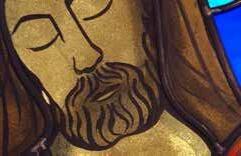
Pursue bold domestic and international outreach and ministry

Recruit, educate, and support ecclesiastical, diaconal, and lay leaders for the Church EQUIP
Two decisions of the church in convention were the need for a full-time Director of Domestic Missions as well as an Associate Director - Family Ministry. Our synod has also long recognized the importance of supporting Word and Sacrament ministry, especially in our smaller, remote communities. In addition, we are being presented with new opportunities for mission outreach in our most populous cities and First Nations communities, all for the glory of God and His saving name! All of these are focused on the above three goals.
The greatest source of financial support to accomplish our work comes from congregation remittances. The table below provides an overview of congregation remittances over the past five years.
The actual remittances in our current fiscal year FY2025 (February 2024 – January 2025) include amounts received in the first nine months up to the end of October 2024. The budget amount for FY2025 also reflects the nine month budgeted amount needed.
For FY2025, the budgeted amount for congregation remittances was $2.45 million. This is an increase from FY2024 and represents just under 60% of the total revenue required to accomplish the work we currently do, including some mission expansion. We thank those congregations who have increased their remittances and encourage others to prayerfully consider how they might also accomplish this going forward, through means with which they have been blessed. “Do not neglect to do good and to share what you have, for such sacrifices are pleasing to God” (Hebrews 13:16).

SOUTH AFRICA – The Lutheran Church in Southern Africa (LCSA) held its 21 st General Synod from December 9-12, 2024, in White City, Jabavu, Soweto, during which time the church elected a new bishop: Rev. Dr. Sibongiseni Elliot Sithole.
In June 2024, Dr. Sithole was installed as Head of the Department for Biblical Studies at Lutheran Theological Seminary in Tshwane (Pretoria), South Africa, where he also serves as student support coordinator. He previously served as a part-time lecturer with the seminary for many years. He also served with the Bible Society of South Africa on the revised isiZulu translation of the Bible.
Dr. Sithole holds a S.T.M. and a Ph.D. in Missiology from Concordia Theological Seminary in Fort Wayne, Indiana, where his doctoral supervisor was Rev. Dr. Klaus Detlev Schulz. “It is a joy to congratulate Elliot on his recent election,” said Dr. Schulz, who also serves as General Secretary of the International Lutheran Council (ILC). “Elliot and I spent our childhood together at Enhlanhleni, KwaZulu Natal. I’m very happy for him, and pray that God will bless his ministry on behalf of the church in South Africa.”
Bishop Elect Sithole succeeds Bishop Modise Maragelo, who did
not stand for reelection. Bishop Maragelo was first elected to serve as head of the LCSA in 2015, and was reelected to a second five-year term in 2019.
A service of installation for Bishop Elect Sithole is scheduled to take place on February 23 in Salem (Piet Retief/Mkhondo).
Among other business during its General Synod, the Lutheran Church in Southern Africa also heard reports and
conducted elections for other positions on the LCSA’s church council.
The Lutheran Church in Southern Africa is a member church of the International Lutheran Council, a global association of confessional Lutheran church bodies and groups which proclaim the Gospel of Jesus Christ on the basis of an unconditional commitment to Holy Scripture and to the Lutheran Confessions.
ILC News


ALBERTA – Rev. Dr. Harold Edmund Ruf, former President of the Alberta-British Columbia (ABC) District, was called to glory early in the morning of December 12, 2024. He was 90 years old.
Dr. Ruf was first elected to serve as ABC District President in 1988, a role in which he continued to serve until his retirement in 2000. Prior to his election, Dr. Ruf had previously served the District as Executive Assistant for Mission services from 1986-1988.
Dr. Ruf was born in Stornoway, Saskatchewan on October 12, 1934. In 1950, he moved to Edmonton to attend Concordia College, where he completed high school and junior college as a pre-seminary student, graduating in 1955. He subsequently attended Concordia Seminary (St. Louis, Missouri), graduating in 1960. He would later be awarded an honorary Doctor of Divinity from the St. Louis seminary in 1996.
Prior to his ministry at the district level, Dr. Ruf served several congregations throughout B.C. and Saskatchewan. His first call (19601965) saw him serve a region in British Columbia north of Kamloops, south of Prince George, and from Barkerville to Bella Coola. During this time, he
helped to found congregations in Williams Lake, Quesnel, and One Hundred Mile House, as well as leading worship in several other communities. He then served in Moosomin, Saskatchewan (1965-1968); Grace Lutheran in Regina (1968-1978); and Port Coquitlam (1978-1986).
Dr. Ruf met his wife, Ruth, while studying in Edmonton. They were engaged during his final year of seminary and married on June 11, 1960.
Dr. Ruf is survived by his wife, Ruth (née Kroll); his daughter, Brenda Horton; and son, Mark and daughter-in-law, Michelle. He is also survived by his grandchildren, Jennifer Fish and her husband, Keegan (great-grandchildren Charlotte and Alexandra); Stephen Horton and his fiancée, Emily; Kaitlyn Brett and her husband, Liam (great-grandchildren Levi, Emerson, and Willow); and Amanda Ruf.
Dr. Ruf was predeceased by his sister, Viola, as well as brothers, Orland and Edgar, and is survived by his younger sister, Audrey. Harold’s parents, David and Katherine ( née Haverstock) passed away in 1972 and 1996 respectively.
Dr. Ruf blessed those among whom he served through his down to earth approach to ministry and through his willingness to step out
in faith for the sake of the Gospel. His favourite Bible passage served as a motto for life: “Have I not commanded you? Be strong and courageous. Do not be afraid; do not be discouraged, for the LORD your God will be with you wherever you go” (Joshua 1:9).
An internment service for Dr. Ruf was held in Edmonton on December 19, 2024. A memorial service wsa scheduled to take place at Concordia Lutheran Church on January 17. LCC clergy in attendance were invited to wear green stoles to take part in a procession and recession at the start and conclusion of the service.
Those wishing to make a donation in Dr. Ruf’s memory are invited to give to Concordia Lutheran Church (Edmonton); Concordia Lutheran Seminary (Edmonton); Grace Lutheran Church (Calgary); or Lutheran Hour Ministries.
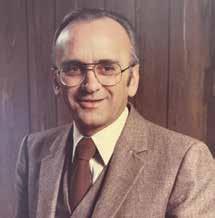
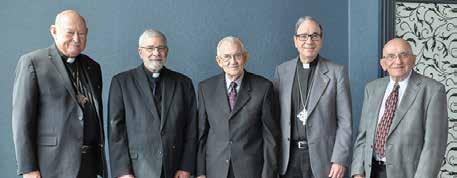
Scripture tells us very clearly that we are to remember God’s many gifts of mercy and love to us (Luke 1:1-4).”
CANADA – Lutheran Church–Canada (LCC) has developed a new resource to help congregations record and preserve their church’s local history: the Congregational Archives Quick Guide.
“Archives contain documents, photographs, and other materials that
are meant to be preserved forever,” the new guide notes. “The reason archives are kept are to support legal rights and accountability; aid in future planning and decisionmaking; and preserve history to enhance research and understanding of past events and relationships.
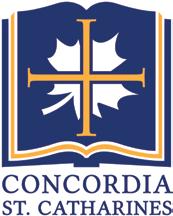
CATHARINES, Ont. – Concordia Lutheran Theological Seminary (CLTS) has announced that it has been granted the right to grant degrees in its own name.
Previously, graduates of the seminary received their degrees
through an Affiliation Agreement with Brock University, with more than 225 graduates having done so over forty years.
The move to degree-granting status saw CLTS involved a lengthy application process, including an on-site visit by a review team. The Post-secondary Quality Assessment Board recommended that CLTS be granted the right to confer the Master of Divinity and Master of Theological Studies degrees.
“Obtaining ministerial consent for granting the MDiv and MTS degrees in our own name brings exciting prospects,” expressed CLTS President Thomas Winger, when this venture was announced in early 2024. “The seminary will maintain complete control over its curriculum and can
But knowing what to keep and how to keep it is a perennial question for congregations. To help congregations navigate these questions, the Congregational Archivist Quick Guide provides clear, concise directions on what to keep and what not to keep in your church’s archives, as well as how to prepare materials for storage and in what ways to store them.
The new guide is being emailed to all congregations in LCC. You can also find it online at LutheranChurch.ca > Resources > Congregational Resources.
The new guide was developed by LCC’s Archives Committee. The committee continues to develop congregational resources as well as to explore options for synod’s national archival needs ( see the Archives committee update on page 15).
explore the possibility of introducing new degrees and programmes that cater to the evolving needs of the church in the near future.”
The seminary expressed heartfelt thanks for their ongoing partnership with Brock University, which continues to provide the seminary with internet infrastructure, security, and student services. CLTS will continue to share its chapel for music faculty recitals and chamber concerts, as well as access to its extensive library (one of the largest reference sources for Lutheran material in Canada), and invites the Brock community to join in daily chapel services.
A degree-granting ceremony will be added to CLTS’ annual Call Service in the spring of 2025.
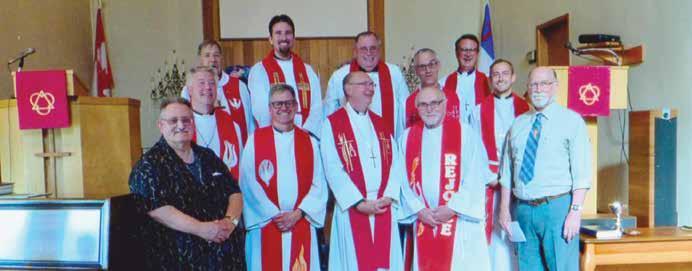
Back row: Revs. Al Dudiak, Adam Chandler, Richard Klein, Steve Chambers, Tom Kruesel, Alex Timm Front row: Revs. Clare Denninger, Kevin Platz, Fraser Coltman, Roland Kubke, Colin Liske, Tim Rumsch
COURTENAY, B.C. – On September 1, 2024, Faith Lutheran Church held the installation service for their new pastor, Rev. Roland Kubke. After four years being served by interim pastors, the members of the Courtenay congregation were delighted to meet their new shepherd, who had been serving a parish in Alberta. Rev. Kubke has served parishes in Saskatchewan, Ontario,
and Alberta since Lutheran Church–Canada was formed in July 1988.
The installation service was conducted by liturgist Rev. Steve Chambers of Our Saviour Lutheran Church in Parksville, with a message from Rev. Fraser Coltman, Circuit Counselor for Vancouver Island Circuit (Rev. Coltman also serves St. Paul’s Lutheran Church, Nanaimo). The lectors were the Rev. Kevin Platz
DICKSON, Alta. – While travelling on vacation, the Whiteheads always enjoy worshipping with fellow Christians. Early this summer, when in Sturgis, South Dakota, they were treated to a bonus surprise when they visited Blessed Emmanuel (LCMS) one Sunday morning. Besides the gift of a warm, friendly welcome in a busy congregation that was preparing for both Vacation Bible School and breakfast outreach during the upcoming biker rally, the Whiteheads were gifted a beautiful banner to take back to their home church!
The banner-marker, Jeanine Harms, credits God as the source of her creativity and designs, which
she masterfully sews into gorgeous banners for churches, individuals, and celebrations. Blessing guests who visit Blessed Emmanuel with the gift of a banner is one way she shares the gifts she has been given. “It’s what we do!” she exclaims with a smile.
King of Kings Lutheran is just one recipient of this blessing. Rev. Russ Howard performed a banner dedication ceremony on September 8, 2024. The congregation expresses its thanks to Jeanine Harms and Blessed Emmanuel!
B. & W. Whitehead
of Grace Lutheran in Port Alberni; and Rev. Tom Kreusel (retired) of Bethany Lutheran Church in Campbell River. Musicians were Arlene Friesen, pianist, and flautist Christine Constabel.
After the service the Ladies of Faith LWMLC provided a light supper for the 80 attendees of the afternoon festivities.
Judy Hagen
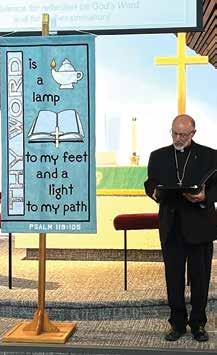
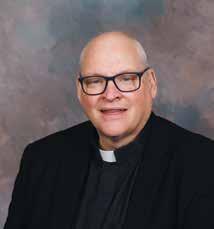
In a recent interview, a man introduced as the champion of progressive news bemoaned the human condition, claiming it has come to lack the “progressive gene type.” He concluded that humanity has no capacity for progressive thought. The progressivism that he spoke of may be defined as the ascendancy of progress especially, but not exclusively, by human achievement.
He noted, for example, that the achievement of the eradication of malaria in Egypt—a country beset with this disease for more than 8,000 years of recorded history—did not gain major media attention. In the same way, he argued, tens of thousands of advances, whether of human origin or naturally occurring, get passed over. Instead, the human condition has become one-dimensional in its capacity for crisis and chaos.
There is a Tennessee Williams story, “Something by Tolstoi,” about a man named Jacob Brodzky whose beloved decided to end their courtship to pursue vocational success. Fifteen years later she returned with the key to the man’s shop in her hand, the key her beloved Jacob had given her before she left, in the belief that one day she would return and he would be waiting for her. But the man, so beset by years of consuming disappointment and despair, did not recognize the key nor his beloved even when she stood in front of him. She departed, never to return, and the man lost the love of his life a second time.
These stories manifest for us the broken, fallen human condition. We
can neither know God, who is true love, nor do we have any capacity to pay attention to Him. Bound to crisis and chaos, exhausted and blinded by disappointment and despair, we do not recognize the Lord, nor what He has accomplished to redeem us—not even when He is right before us in the Christmas creche nor when He is lifted upon the throne of His cross.
He comes into your very flesh in Holy Baptism, in His Holy Supper, in the communion of the saints, in the proclamation of His Word.
The One who is the Key to David’s House, who opens what no one can close and closes what no one can open, and who holds the keys of death and Hades… He remembers You, whether you forget Him for 15 seconds or 15 years. His love for you is stronger than your love for Him. It is an unrequited love that cannot be deterred.
This One has given to you His Church, the keys to His kingdom, holy absolution, and the forgiveness of sins. And He has set you in this time to make manifest to the nations what He has done, what He is doing, and what He will do.
The season of Epiphany begins with God speaking through the Magi, to the Lord’s bride who had long forgotten her first love. And every day throughout Epiphany, God continues to speak to His people through the various manifestations of the Lord’s presence—from the powerful witness given at our Lord’s baptism, all the way through to His transfiguration, leading to the greatest manifestation of the Lord at His suffering, death and resurrection. This was not only
for the sake of His Israel of old but for all peoples.
God makes Himself manifest to us as well through Word and Sacrament. He is making it clear that Jesus is your Lord, your Saviour, your first love, your life, and your salvation. It is easy, in our mixed-up world and our broken and despairing lives to forget what matters most. By His greater manifestations, God puts to naught all the manifestations of sin and brokenness in our lives.
The Lord gave His bride, Israel, Simeon of old, Lazarus, the thief on the cross, and Stephen, among others, to proclaim the Lord’s appearance to save His people. It seems to me that the pace at which the Lord is expanding the Church Triumphant today continues to make manifest the Lord’s salvation.
The Lord gave to His bride, Israel, the Magi. In the same way, the Lord is giving His Church here in Canada the nations of the world. As they appear on our shores, they also ask: “Do you know who this Christ fellow is and where I may I go that I too may worship Him?”
Both in Word and deed God continues to make manifest His salvation. And you are part of that witness, both with your life and with your death!
Grant us grace to see Thee, Lord, Present in Thy holy Word – grace to imitate Thee now And be pure as pure art Thou That we might become like Thee At Thy great Epiphany And may praise Thee ever blest, God in man made manifest. (LSB 394:5)
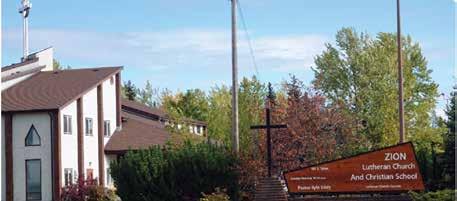
PRINCE GEORGE, B.C. – From October 12-13, 2024, Zion Lutheran Church and Christian School celebrated their 100 th anniversary as a congregation (the school is 25 years old).
In 1924, faithful souls of The Lutheran Church–Missouri Synod organized what became known as Connaught Hill Evangelical Lutheran Church under the guidance of Rev. Henry Kuring, who held the first service on Christmas Day of 1924 with 40 people in attendance. In 1988,
a new church was built and the name was changed to Zion Lutheran Church. In 2001, Vanderhoof Lutheran Church and Zion Lutheran Church entered into an agreement for the pastor of Zion Lutheran Church to also serve Vanderhoof Lutheran Church. This arrangement was formalized in 2022 when a dual parish agreement was entered into.
On October 12, an anniversary dinner was held. Attendees included current members, former members, and some former pastors. Many
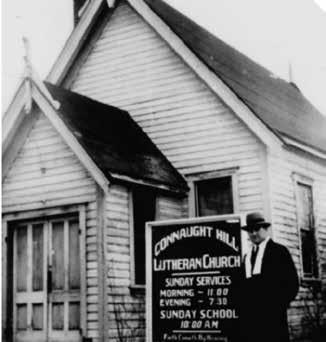
stories were shared along with greetings from former members and pastors who were not able to travel to Zion for the festivities. On October 13, a 100th anniversary service took place, with Rev. Robert Mohns, Lutheran Church–Canada’s West Regional Pastor, serving as preacher. The Zion Handbell Choir provided some of the music for the service, with a number current and former ringers coming together to play for this special occasion.
Gail Haeussler
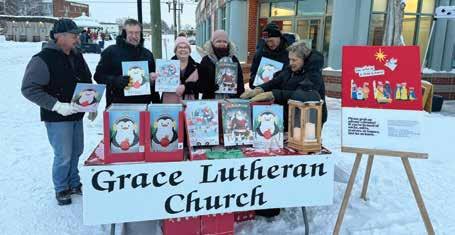
DRUMHELLER, Alta. – Jesus is the light of the world. And when your local community has a celebration called the “Festival of Lights,” it only makes sense that Christians should be in the “mission field” with His message of light and love. For three years now, the congregation at Drumheller has given out hundreds of
Advent calendars during this popular community celebration. Members of the community and friends gather at the end of November for the annual lighting of the Christmas tree, and to enjoy firepits with treats such as apple cider, hot chocolate, and candy canes.
Grace Lutheran decided to use this community event as an opportunity
to teach the participants about the meaning of Advent, and to supply Advent calendars to the children of the community.
In addition, each year numerous bags filled with new toques, mitts, scarves, and warm socks are made available to anyone in the community who has need. God has supplied the needs of the congregation by ensuring that for three years in a row the church has had the exact number of Advent calendars needed for the evening event. This year, 350 chocolate Advent calendars were given out and four large bags filled with items for the cold. Families stopped to chat around the firepit, to read the poster about the meaning of Advent, and to express their appreciation for the calendars and clothing. Jesus does indeed enable His church to be light in a dark world.
VANDERHOOF, B.C. – On Sunday, September 8, Zion Lutheran Church (located in Prince George) and Vanderhoof Lutheran Church held their second annual joint fall service and picnic. The service was held at Vanderhoof, with the picnic following at nearby Riverside Park. Food, fellowship, and games were enjoyed by all in attendance. Gail Haeussler
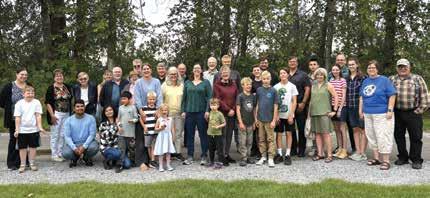

STONY PLAIN, Alta. – Two major milestones were celebrated on Sunday, October 27, 2024, at St. Matthew Lutheran Church. The first was the anniversary of the Reformation of Martin Luther and the nailing of the 95 Theses to the front doors of the Wittenburg Church. The second was the 130th anniversary of the formation of St. Matthew Lutheran Church in Stony Plain.
The dedication of St. Matthew took place November 5, 1894, and the Lord and Saviour has blessed the
congregation with dedicated pastors and members for the last 130 years. After the service, the congregation met downstair in the Luther room for a time of fellowship, a scrumptious potluck dinner, and a delightful array of sweets.
The church’s forefathers felt it was important for the children of the congregation to have a Christian education, so on November 12, 1894, the school was officially opened. Today, SML Christian Academy has an enrollment of 220 students from kindergarten to grade nine, with a staff
of eleven teachers, four educational assistants, an administrative assistant, and a principal. Approximately 25 percent of students are members of St. Matthew, fifty percent come from a variety of other Christian denominations, and the remaining 25 percent have no church affiliation. SML Christian Academy continues to be a mission field for the residents of Stony Plain and area.
The church is blessed with three dedicated pastors who lead Bible studies, confirmation studies, religious instruction at the school for grades seven, eight, and nine, visit shut-ins and hospitalized, and who lead the congregation in worship with two services on Sundays. There are also dedicated lay members and staff who work with the pastors to carry out the church’s mission statement. The congregation prays that the church will continue to grow in God’s Word as it has over the past 130 years.
Gord Schoepp, Vice-chairman

SWIFT CURRENT, Sask. – On November 3, 2024, Mt. Calvary Lutheran Church celebrated their 95 th anniversary. A display of past photos portrayed a visit down memory lane, and Rev. Travis Heide and his father Rev. Randy Heide presented the service.
Rev. Travis Heide gave a short presentation on Lutheran Bible Translators of Canada (LBTC), and Rev. Randy Heide presented on Lutheran Association of Missionaries and Pilots (LAMP). Joining the celebration was Mt. Calvary’s sister congregation from Trinity, Ponteix,

who contributed music from their choir and organist. Following the special service, approximately 50 members enjoyed a catered roast beef dinner.
Shirley Sherman

WATROUS, Sask. – Saskatchewan church workers met from September 16-18, 2024. The conference was organized by the Northlands circuit, with circuit pastors leading the opening communion worship service as well as morning and evening devotions. Participating pastors included: Rev. John Blum (La Ronge), Rev. Chris Mclean (Nipawin, Melfort,
Hudson Bay, Mistatim), Rev. Jakob Valsson (Middle Lake), and Rev. Clint Magnus (Humboldt). Regional Pastor Rev. David Haberstock preached the opening sermon and gave synodical and regional updates during the day on Tuesday and Wednesday.
The speaker for the conference was Dr. Iain Provan, an Old Testament scholar and professor of
Biblical studies at Regent College in Vancouver. He conducted four sessions that addressed current issues like gender issues, medically assisted suicide, and many other things that churches face in the world today. He laid the groundwork for how society got to this place, how to deal with these things in congregations, and what the role of the church should be going forward. He was well-received and provided valuable tools and insights as church workers proclaim the Gospel to an ever-changing world.
Watrous’ Little Manitou Lake is known as the Dead Sea of the prairies, and so the group was able to have some great fellowship taking in the waters during free time, as well as over the wonderful catered meals provided by the resort. Overall, it was a refreshing time of fellowship, bonding, learning, and bringing glory to God together as church workers. Rev. Clint Magnus

We live in time. Time is both linear and cyclical.
Cycles of time such as seasons, yearly anniversaries, and recurring “holy-days” give meaning to our lives. On certain dates, we take stock of things, are reminded of our history, and review the narrative we tell ourselves about our identity. In the Church, we call these recurring Holy Days (or “holidays”) the Sanctoral Calendar, from the Latin word “sanctus” meaning holy.
The world also has a “sanctoral calendar” of things which are “holy” or “sacred” to it. For instance, in Canada Remembrance Day (November 11) is an annual day to ponder our history and values as a nation. It recalls Armistice Day, which marked the end of the Great War.
As new days, months, or seasons are added to the secular “sanctoral calendar,” it is worth pondering what is being taught by them—especially “holy days” or seasons that don’t recall a specific historical event. What do these days mean? What do they intend to teach? Holy days are set apart for the purpose of teaching and driving home certain truths or values for a group of people. A sanctoral calendar is a way of making your collective values concrete. In a world increasingly less Christian, celebrating our Christian calendar becomes increasingly important as a bulwark against the teachings of the world.
The first half of the Christian calendar (Advent, Christmas, Epiphany, Lent, Easter) marks the life and work of Jesus—from His birth, and the events surrounding it, to His
suffering, death, and resurrection. It does so because we live, move, and have our being in the God made flesh, and all history revolves around this universe altering reality!
The second half of the Church Year (from Pentecost onward) marks the life and growth of the Church, which is His body. It is through us, His Church, that Jesus brings the benefits of His life, death, and resurrection into the world. These two truths (Jesus’ incarnation and His Church) are the key to understanding all of reality.
Seasons on a calendar also have special ways of celebrating and distinguishing them. Recently, you may have decorated your house for Christmas, and you may have taken all those decorations down. During Epiphany, when the Christmas decorations are put away, people often comment how bare the church looks. Well, let me tell you a great tidbit of churchly tradition that most of us have lost track of!
Prior to the advertising industry’s invention of the modern Coca-Cola Santa Claus and the secular Christmas season (from Black Friday to Boxing Day blowouts) focused on buying, people did not decorate for Christmas in Advent. Rather, the decorations and tree came out on Christmas Eve and were left up throughout the 12 days of Christmas. This was a high holy season in the midst of the darkest part of the year (in the northern hemisphere) to drive the cold winter away and remember that the Light of the World has come!
Now, due to the constant push for purchasing, Christmas decorations
come out earlier and earlier, and tend to be put away by most on Boxing Day. But whether your pastor, or altar guild, try to keep up the tree and decorations till Epiphany (January 6) or not, the decorations and visual markers of joy go away.
But historically this was not so. Yes, the boughs of holly and baubles on the tree went away (real trees and branches wither after the 12 days). But the Nativity scene was left up in houses and churches until February 2, 40 days after our Lord’s birth, the day Mary went to the Temple for purification (Luke 2:22-32). This was because until the ritual cleansing of mother and baby on the 40th day (think of the Flood and the cleansing of the earth from sin, or baptism and the cleansing of individuals by water and the Word), mothers were often in seclusion, and thus, the Nativity or our Lord was honoured and remembered till that day. February 2 thus served to bookend the Christmas season, and became known not just as the Purification of Mary, but as Candlemas, for on that evening was held a Divine Service with candles (the origin of our Christmas Eve candle light services) at which the light of the World was now publicly presented to the World. February 4 is the earliest day on which Ash Wednesday can occur, and as the light spread from Jesus into the world, the Christian calendar has a proliferation of saints days in February—which populated the Church’s meditations in Lent—leading up to the great joy of Easter! This Church calendar and its traditions are a concrete way to celebrate and remember our faith.
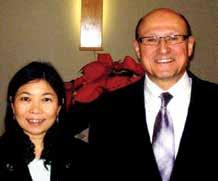
WINNIPEG, Man. - After more than 44 years in the ministry, Rev. Dr. Harald Schoubye, with his wife, Cynthia, retired from service as pastor of Holy Cross Lutheran Church on October 31, 2024.
Dr. Schoubye was born in Berlin, Germany, in 1955; moved to Canada in 1961; and grew up and attended school in the North end of Winnipeg. He received his baccalaureate from the University of Manitoba. After
receiving his M.Div., he was ordained in September of 1980. He received a Master of Theology in Historical Theology in 1991 and a Doctor of Theology degree in Exegetical Theology from Concordia Seminary, St. Louis, in 1996.
Dr. Schoubye has served his Lord at congregations, colleges, and seminaries in Manitoba, Saskatchewan, Missouri, Minnesota, Wisconsin, and British Columbia. In addition, he has ministered in many nations, which would give the congregation opportunity for direct involvement in world missions.
Due to his wife’s illness, they moved back to Winnipeg from Vernon, B.C., where he had been pastor of Living Word Lutheran Church, and because of the retirement of Rev. Richard Kruesel at that time, Dr. Schoubye became the vacancy pastor of Holy Cross. The congregation became so used to Dr. Schoubye’s sermons and dedication that they hoped he would accept

MOOSE JAW, Sask. – Emmanuel Lutheran Church, in conjunction with their 90 th anniversary celebration, designated the Narthex Christmas tree as a “Memorial Tree,” decorated with photos of congregation members and loved ones who have been called to glory. The project was well received by the congregation, with nearly 60 photo submissions. The congregation is reminded of the Lord’s promise in the Gospel: “Blessed are those who mourn, for they shall be comforted” (Matthew 5:4). Rev. Jason Schultz
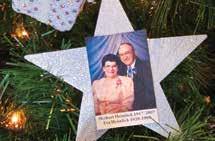
the call to become their permanent pastor. On November 29, 2015, he was installed at Holy Cross Lutheran Church and served the congregation faithfully up to the day of his retirement.
On October 27, 2024, Rev. Schoubye gave his last Sunday sermon, which was followed by a special luncheon lovingly prepared by the members of the church. In appreciation for the service that both Dr. Schoubye and his beloved wife Cynthia gave to Holy Cross, a special blessing was spoken and tokens of appreciation (an engraved watch and a diamond necklace) were presented. The celebration ended with a muchdeserved standing ovation to a wellloved pastor, Rev. Dr. Harald Schoubye.
Holy Cross Lutheran Church is grateful to God and his servant Rev. Schoubye for his pastoral ministry during the past nine years. The congregation prays for God’s blessing as Rev. Schoubye begins his welldeserved retirement.
Larry Krause

GRANDVIEW, Man. – Recently a combined celebration church service and luncheon at Hope Lutheran Church celebrated the 40th anniversary of the formation of the dual parish of Hope and Holy Trinity Lutheran in Inglis. Pictured cutting the cake are Rev. Tim and Kristin Schneider.
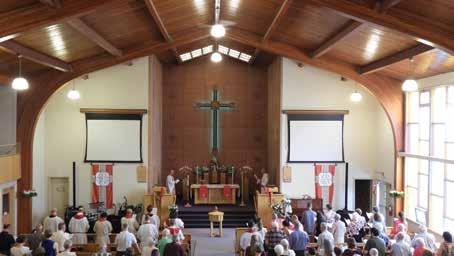
REGINA, Sask. – It wasn’t that long ago—only 100 years—when a group of founding fathers came together to sign the constitution of a downtown church in Regina: Grace Evangelical Lutheran Church.
Celebrating such a grand event required all hands on deck. Industrious members poured through volumes of history, preparing a bound history book and archives for viewing. Others put their skills to work publishing a pictorial directory, and a beautiful, handcrafted oak photo frame was designed and placed in the narthex displaying all the members’ photos. Others hand-painted memento souvenirs highlighting 100 years of blessings.
Prior to the main weekend celebration in June, a time capsule from the church’s cornerstone was opened, and inside many historic treasures were preserved perfectly!
At the front of the church, new VDMA Reformation banners depicted the anniversary theme, “The Word of the Lord endures forever” (1 Peter 1:24-25).
The guest preacher for Sunday morning’s Divine Service was a former vicar, now Regional Pastor, Rev. David Haberstock. At the afternoon Anniversary Celebration Service, the guest preacher was Rev. Jeremy Swem, Senior Pastor of Our Saviour Lutheran Church and School in Grand Rapids, Michigan. Beautiful singing enhanced this service by a mass choir compiled from local Lutheran Church–Canada churches and directed by Rev. Paulo Brum of New Beginnings Lutheran Church.
Another momentous Sunday this year was the baptism of 14 adults and children at one service alone. The congregation rejoices in gratitude and praise for all that God has done
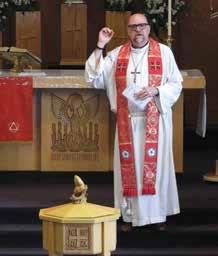
over the many years, and which He continues to do today.
In July, a son of the congregation, Rev. Elmer Mushumanski of Armstrong, B.C., served as a guest preacher. During his sermon, he recounted that his first visit to Grace as a young man new to the city was thanks to one of our members, his landlord, just inviting him to come to church, remind the congregation of the slogan, “Each 1, Reach 1.”
This year, the congregation replaced its time capsule. Most of the current congregation won’t be here when it next gets re-opened, but God and His Word will prevail as He has promised. The congregation rejoices in His faithfulness, year after year. Most importantly, they rejoice in the hope of eternity with Him along with all the saints that have gone before.

WELLESLEY, Ont. – For more than 20 years, the town of Wellesley has enjoyed an evening Christmas parade. And for more than 20 years, First St. Paul’s Lutheran Church has enjoyed participating in the Christmas parade, with their church float depicting the joyous birth of Christ Jesus, along with adoring shepherds and angels. The children shout out their message of joy: “Merry Christmas!” It was a frosty cold night this past December 13, but hot chocolate and games at church afterward warmed everyone up.
Rev. Andy Schroth

COBOURG, Ont. – East District
Lutheran Young Adults (EDLYA) hosts four retreats a year at various churches in Lutheran Church–Canada’s East Region. This year’s Fall Retreat was hosted by St. Paul’s Lutheran Church in Cobourg from October 18-20, 2024.
Rev. Dr. Kevin Fast gave a presentation called “That's Catholic,” offering a study in the history, meaning, and use behind the traditions of the catholic church.
The ladies of St. Paul’s sat in on the presentation, and provided a lunch
for the group between sessions. This wasn’t the only way the women of the East Region showed their support— funds totalling $207 were raised through an offering at the Fall Rally of the LWML Toronto Zone held at Grace Lutheran Church in Oshawa, in support of EDLYA (and the group says thanks!).
There was also an outing to the local beach on Saturday. It was chilly, but warm enough for participants to get a game of beach football going. There were also
lots of flat stones perfect for rockskipping and stacking.
EDLYA offers a warm farewell to Patrick and Michelle as they resign from the board, as they looked forward to getting married in January. The group welcomed new president, Chris, and food coordinator, Eva, both from Kitchener/Waterloo.
The EDLYA team invites you to encourage the young adults in your congregation to attend upcoming retreats and get connected. Learn more at edlya.ca.
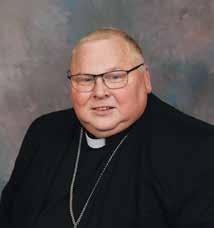
“ That’ll leave a mark.” That’s a phrase I often heard on the farm or working in the machine shop. Someone would drop something on their foot, bump their head on a low beam, or strike the wrong nail with the hammer—and then you would hear someone say: “That’ll leave a mark.” Usually it was meant in jest, but it was often true.
A trip to the hospital and a few stitches later, one was left wondering if there would be a mark left—a scar to remind you of the event. Some of you have such scars. No doubt you can recall the circumstance that led to the mark you bear. Over time they may fade, or you may try to cover them, but they remain. Some, like broken bones, are hidden, but every time it rains you are reminded.
One day as I was trying to pry up a log, the shovel handle slipped. I can still see the blood running down my brother’s lip. Mom ran him to the hospital. He needed a few stitches, but no lasting mark was left—at least not on him. Every time I hear someone say, “that’ll leave a mark,” I see my brother’s bloody lip. I guess you could say I am the one who bears that scar.
Not all the scars we bear are the result of a physical injury. Someone may have said or done something against you, and their words or deeds left a mark on you. You might try to ignore it or laugh it off. Yet, the pain remains. Others may not see the mark. You, however, carry it with you.
Sometimes we are the ones who leave a mark on others—with a careless word or one said in anger. Rather than a slip of a shovel handle,
a slip of the tongue leaves its mark. Because we bear the mark and scar of sin, this happens far too often, even among godly church people. The struggle for control or to be the one in the right (as we see it) leaves its mark on many a congregation or convention meeting. We bear the scars inflicted upon us by others. They bear the scars we have inflicted upon them.
The only way to deal with these sinful scars is with more marks and scars. From the order of Holy Baptism: “The Word of God also teaches that we are all conceived and born sinful and are under the power of the devil until Christ claims us as His own. We would be lost forever unless delivered from sin, death, and everlasting condemnation. But the Father of all mercy and grace has sent His Son Jesus Christ, who atoned for the sin of the whole world, that whoever believes in Him should not perish but have eternal life… Receive the sign of the holy cross both upon your forehead and upon your heart to mark you as one redeemed by Christ the crucified.”
God has put His mark on us. We are reminded of that also at a committal: “May God the Father, who created this body; may God the Son, who by His blood redeemed this body; may God the Holy Spirit, who by Holy Baptism sanctified this body to be His temple, keep these remains to the day of the resurrection of all flesh” (LSB Agenda).
And Peter 2:24 reminds us that Jesus “Himself bore our sins in His body on the tree, that we might die
to sin and live to righteousness. By His wounds you have been healed.” Jesus shows the marks of our redemption in His hands and side. He took that mark so that we might have forgiveness for the sinful marks and scars inflicted on others and ourselves. “Behold,” He tells us, “I have engraved you on the palms of my hands” (Isaiah 49:16).
Jesus put His mark and name on us in Holy Baptism and marked Himself with our name. Our loving God marks us as His own. He bore our sin on the cross, and the marks of our salvation will be seen by all in the judgement. Those who have rejected Him and pierced Him will see. And those who look to Him in faith for forgiveness and salvation will see. To those us of who believe, He promises to remove every tear from our eyes and every scar of our mind, body, and spirit for eternity.
Crown Him the Lord of love. Behold His hands and side, Rich wounds, yet visible above, In beauty glorified. No angels in the sky Can fully bear that sight, But downward bend their wond’ring eyes
At mysteries so bright.
Crown Him the Lord of life, Who triumphed o’er the grave And rose victorious in the strife For those He came to save. His glories now we sing, Who died and rose on high, Who died eternal life to bring And lives that death may die. (LSB 525:3-4)

KITCHENER-WATERLOO,
Ont. – The Kitchener Circuit holds circuit worship services regularly, which helps to foster deeper relationships with fellow brothers and sisters in Christ in nearby parishes, and help congregations see how they can share resources
and personnel and be of assistance to one another.
The Circuit also offers an Easter Vigil service at Faith Lutheran Church, Kitchener; an Ascension Service at St. Paul’s, Elmira, or Holy Cross, Kitchener; and a Reformation Hymn Fest at Redeemer, Waterloo. Being added next year is a service of Lessons and Carols in early December.
Attendance is growing and so is the joy of Lutheran folk connecting. Lay leaders in the circuit have also been gathering to see how they can work together as congregations. Circuit youth gather together, as do young adults. The circuit is thankful for many willing servants to keep everyone connected in Christ Jesus. Rev. Andy Schroth, Kitchener Circuit Counsellor
On January 6, Rev. John Rapp was host at Messiah Lutheran Church (Waterloo) for an evening Epiphany worship service with Holy Communion. Rev. Davi Schmidt (Bethel Lutheran Church, Kitchener) was preacher. Mrs. Heide Gallas led a Circuit Bell Choir. Members at Messiah provided coffee and treats for folks to enjoy after the service.
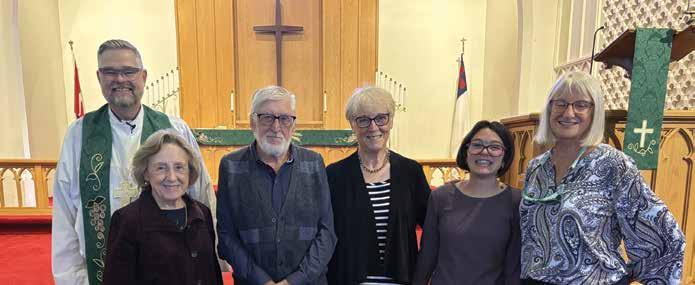
ST. CATHARINES, Ont. – By late fall 2024, Christ Lutheran Church had officially welcomed twelve new member households—just over 25 people—into the church since Rev. Todd Hoeff’s arrival as the congregation’s pastor in 2020.
The church held a service to celebrate this milestone, followed
by a reception with refreshments. The new members are varied in age and backgrounds, and includes transfers from Lutheran parishes, professions of faith, and still others from faraway places outside of Canada. All are faithful in their attendance and support the church’s ministry. These new member
additions are also complemented by a number of member baptisms and youth confirmations that have also taken place.
The congregation gives gratitude to the Lord Jesus Christ who enlarges His family of faith.
Rev. Todd Hoeffs
WELLESLEY, Ont. – First St. Paul’s Lutheran Church recently took time in a coffee hour with a delicious cake and other sweets to give thanks to their organist, Elizabeth Schroth, who has been playing the organ and leading services for more than 15 years. Mrs. Schroth also leads the brass players who play regularly during worship, as well as the choir which sings regularly in worship—testaments to her joy in making music to the Lord Jesus. Rev. Andy Schroth
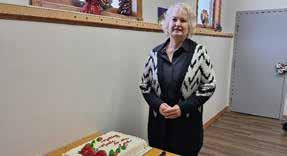

GRIMSBY, Ont. – What started as an idea in November at the joint Hamilton-Niagara Winkle quickly came together as a lively event at the beginning of January. With Rev. Ted Giese of Mount Olive Lutheran Church in Regina, Saskatchewan, scheduled to teach a short-term class at Concordia Lutheran Theological Seminary in St. Catharines, the local pastors hoped to make the most of his time in Ontario: Rev. Giese was invited to speak at a joint circuit event, called “Under the Influence: Recognizing the Impact of the Media on the Life of a Christian.”
A crowd of 90 faithful braved the winter snow to gather at Christ Our Saviour (Grimsby) for the January 11 event. The church was full! Attendees included members of all ages from most of the churches in the Hamilton and Niagara circuits, with some even driving over an hour from outside the circuits. The event began with a short devotion led by Rev. Lantz and ended with a Vespers service led by Rev. Gillard.
Rev. Giese spoke in two sessions. The first was an eye-opening introduction to the concept of the
Overton Window, a framework for understanding the shift in the perceived acceptability of certain arguments and societal topics in public discourse. He then demonstrated how various forms of media are used to subtly manipulate, direct, and curate what are deemed to be acceptable thoughts through a process of desensitization and fear.
Following a schnitzel lunch, the second session sought to answer some practical questions: “What does this mean for a Christian?” and “What tools do we have at our fingertips to ‘guard the good deposit entrusted to us?’” What became abundantly clear is that faithful Confessional Lutherans have a wealth of tools at their disposal to engage these challenges. What is necessary is that Lutherans become reacquainted with them and commit them to memory.
The event was an excellent opportunity to be mutually encouraged by fellow Christians, and the attendees expressed a desire to continue to build on this event.
Rev. David Zakel and Mrs. Stephanie Zakel

THAILAND – In the northern reaches of Thailand, nestled among the mountains of Chiang Mai, a remarkable new mission has taken root among the Shan people. Supported by Lutheran Church–Canada (LCC) and carried out by faithful workers of Thailand Concordia Lutheran Church (TCLC), this mission is a living testimony to the performative and transformative power of the Gospel.
The Shan people, a largely unreached ethnic group in Southeast Asia, face unique cultural and spiritual challenges. Many Shan individuals have migrated to northern Thailand from Myanmar in search of economic opportunities, often living on the margins of society.
Rev. Niran Temsakun, Senior Pastor of TCLC in northern Thailand, and his evangelism team have demonstrated extraordinary faithfulness and dedication in their outreach to the Shan community in and around Chiang Mai. With hearts full of Christ’s love, they have embraced the Shan people, many of whom face significant challenges as migrant workers in Thailand. Through personal connections, catechesis, and pastoral care, they have brought the Gospel to those who had not yet heard it, offering the hope and peace that comes only in Christ Jesus. Their ministry is grounded in the clear teaching of God’s holy Word, with the
Small Catechism serving as a key tool for sharing the foundational truths of the faith.
Rev. Niran reflects on the progress of this mission with a heart full of thanksgiving: “Thank God for the ministry among the Shan brothers and sisters, which has begun with His love. We have started teaching the Small Catechism from Dr. Martin Luther to everyone the Lord has connected us with, fostering learning and spiritual

growth. Praise the Lord for all those who have responded so positively to the Gospel.”
Rev. Niran and his team’s tireless efforts in instructing and relationshipbuilding are fostering a growing community of believers among the Shan people, pointing to the transformative power of the Gospel and the faithfulness of God in His mission to all nations. With support from LCC, this new mission is expanding its efforts to include regular
worship services and works of mercy for the Shan community.
As the Shan brothers and sisters grow in the knowledge of their faith, they are not only embracing the truth of the Gospel but are also being equipped to share it. One gifted individual from this young mission, brother Rapeepan, has enrolled in the Luther Institute-Thailand to receive more formal theological education in order to be better equipped to share the Gospel with his community. As we see in this man and others from the community, the transformative nature of the Gospel means that this mission is not a one-way street. The same Word that the Holy Spirit has worked in their lives will soon flow through them to others, extending the reach of God’s Church in northern Thailand and beyond.
The establishment of this mission in Chiang Mai reminds us of the power and promise of God’s Word. The Gospel is not only being taught but is actively at work, creating faith, transforming lives, and building the Church among the Shan people. As Rev. Temsakun says, we praise the Lord for this ministry, which has indeed “begun with His love.”
May this work among the Shan people inspire Lutherans everywhere to hold fast to the Word of God, trusting in the promise that His Word will not return empty (Isaiah 55:11).
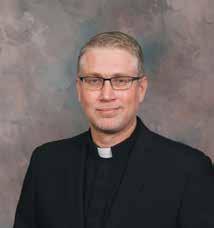
The mission of the Church is fundamentally rooted in the proclamation of God’s Word and the extension of His love to a world in need. As confessional Lutherans, we understand the relationship between Veritas (truth) and Caritas (love/charity) as inseparable and complementary realities that guide our engagement in the mission field. Both are not merely principles but manifestations of Christ Himself—He who is the Truth (John 14:6) whose love compels us (2 Corinthians 5:14).
The heart of the Church’s mission is Veritas —the truth of the Gospel. Jesus commands His Church to “make disciples of all nations” by baptizing and teaching them (Matthew 28:19-20). This teaching is not vague or subject to cultural reinterpretation but is grounded in the unchanging truth of God’s Word. In a world increasingly dismissive of objective truth, our mission work must remain steadfast in the proclamation of Christ crucified and risen for the salvation of sinners (1 Corinthians 1:23). Veritas is not negotiable, for it is the power of God unto salvation (Romans 1:16). The truth of God’s law reveals sin and the depth of human need, while the truth of the Gospel offers the free gift of forgiveness, life, and salvation through faith in Jesus Christ.
Caritas flows from Veritas and is its lived expression. Truth without love can become cold and Pharisaical, a mere intellectual assent to doctrine. Love without truth, on the other hand, degenerates into sentimentality, unable to save or transform. The confessional Lutheran missionary recognizes that true love seeks the ultimate good of the neighbour, which is found in reconciliation with God through Christ Jesus.
Caritas compels us to engage in acts of mercy and service as reflections of the Gospel. When Jesus fed the hungry, healed the sick, and comforted the downtrodden, He did so out of compassion, but always with the ultimate goal of drawing people into the kingdom of God. Similarly, in the mission field, our love for others must be embodied in both word and deed. To care for the body without addressing the soul is to withhold the very thing people need most—the life-giving truth of Jesus Christ.
In the mission field, Veritas and Caritas are like two sides of the same coin. Consider Paul’s words in Ephesians 4:15: “Speaking the truth in love, we are to grow up in every way into Him who is the head, into Christ.” The truth we proclaim must always be motivated by love, and the love we
demonstrate must always point back to the truth of Christ.
This integration is critical in addressing cultural challenges and spiritual opposition. In proclaiming the truth of Christ in environments hostile to the Gospel, missionaries must act with humility and patience, demonstrating a love that reflects the self-sacrifice of our Lord. Works of mercy, such as feeding the hungry or providing medical care, become powerful testimonies of the Gospel when paired with the clear proclamation of God’s Word.
1. Faithful Catechesis: Missionaries must prioritize teaching the faith with clarity and fidelity. This includes translating and distributing faithful confessional materials, ensuring Veritas is accessible and understood.
2. Works of Mercy as Gospel Witness: Works of mercy are not merely humanitarian gestures but deliberate reflections of Christ’s love. Feeding Programs, establishing and supporting Lutheran Day Schools, or offering medical care should always be paired with Gospel proclamation and catechesis.
3. Cultural Sensitivity Without Compromise: While Caritas involves adapting methods to meet people where they are, Veritas requires that the core message of the Gospel remain unchanged. The missionary
Cont'd on next page
must discern how best to communicate truth in culturally appropriate ways without diluting or compromising its content.
4. Prayerful Dependence: The integration of Veritas and Caritas depends on the Holy Spirit, who works through Word and Sacrament to create and sustain faith. Missionaries must continually seek God’s guidance in delivering Christ’s truth and love in their service.
The relationship between Veritas and Caritas in the mission field is not a tension but a harmony, reflecting the nature of Christ Himself—truth incarnate and love embodied. Confessional Lutheran missions must hold fast to this integration, knowing that by speaking the truth in love, God’s kingdom advances and His most holy name is glorified.
May we, as the Church, faithfully proclaim the truth of God’s Word and radiate the love of Christ, so that all may be drawn to the salvation and eternal life found in Him alone.
ONLINE – During the pandemic, Rev. David Milette of l’Église luthérienne du Bon Berger (Moncton, NB) began providing online weekly Vesper Services in French. Lutheran Church–Canada (LCC) Missionary-at-Large (MAL), Rev. Dr. David Somers, joined forces with Rev. Milette and the evening Office became a regular feature of LCC’s French Ministries, with a baker’s dozen of regular participants in five provinces.
The service was originally meant to last the duration of pandemic restrictions but, when it came time to stop because people could again attend church in person, there was interest in continuing this as a supplemental service, giving rise to a trial prolongation.
For the past six months, average attendance for online weekly Vespers has been in the twenties and includes connections from the United States and, most notably, Haiti. The Haitian participation stems from LCC’s Institut liturgique luthérien francophone courses which have been offered through the Séminaire Théologique Concordia d’Haïti
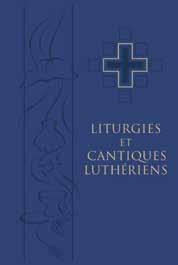
The weekly Vespers are now followed by a brief training session for the Haitian seminary students invited by Rev. Walta Clercius (Seminary Dean, and Assistant MAL for LCC French Ministries). In this way, the Vespers liturgy is newly gaining acceptance in the Église évangélique luthérienne d'Haïti. One of the participants, seminarian Marc Jr. Libéral, has even begun training other Haitian Lutherans locally in how to conduct Vespers.
LCC Pastoral Colloquy candidate, Rev. Jean-Luc Damas in British Columbia, also participates as liturgist as part of his formation in French-language liturgics.
An unexpected connection came from an individual in France who discovered these online services and began attending—at 1:00 a.m. in his timezone! He obtained a copy of LCC’s French Hymnal, Liturgies et cantiques luthériens, and started up Vespers in his Reformed congregation (the nearest Lutheran congregation being hours away).

– Lutheran Church–Canada (LCC) President Timothy Teuscher has received a letter from Bishop Alexander Yurchenko of the Synod of Evangelical Lutheran Churches of Ukraine (SELCU) expressing gratitude to LCC for its ongoing partnership.
Bishop Yurchenko writes: “I would like to thank you for many years of friendship and cooperation with the SELCU, and the immense support that your Church provides to our Synod, and also, through us, to many thousands of disadvantaged Ukrainians, those who remain in the country, and those who were evacuated during the war.”
Bishop Yurchenko goes on to express gratitude for LCC’s support of its
Missionary-at-Large and SELCU pastor, Rev. Oleksiy Navrotskyy, who is currently serving in Mykolayiv.
“I am very happy that Pastor Oleksiy and the entire SELCU brotherhood have such faithful and sacrificial partners in you,” writes Yurchenko. “I hope and ask you to continue to support Pastor Oleksiy and his family and the direction of their wonderful ministry in the future.”
The full letter can be read on CanadianLutheran.ca.
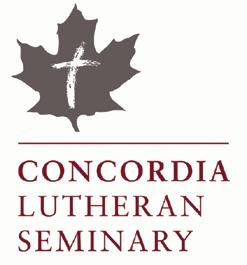
EDMONTON – Rev. Dr. Jeffrey Kloha has declined the call to serve as the new president of Concordia Lutheran Seminary (CLS). CLS asks for prayers as the seminary’s Board of Regents, along with the Search Committee, continue to discuss further steps in the call process.
The seminary is currently being served by Interim President Joel D. Heck.
ONLINE – Concordia Lutheran Seminary (CLS – Edmonton) held its Spring 2025 Quest course beginning in February, on the theme “Insights from a 50-year Journey through the Old Testament”.
Rev. Dr. Joel Heck, Interim President of CLS taught the free course, with each week focusing on different topics, sharing some of the most important insights Dr. Heck has learned about the Old Testament during his ministry.
As with every Quest course, interested parties can attend in-person or live online. Stay up-to-date on upcoming courses by visiting CLS’ website Concordiasem.ab.ca or via their Facebook Page.
SURREY, B.C. – On November 24, 2024, Rev. Dr. John R. Wilch— professor emeritus at Concordia Lutheran Theological Seminary (CLTS) in St. Catharines, Ontario—was called to glory. He was 90 years old.
Dr. Wilch was born on May 19, 1934, in Columbus, Ohio, to Rev. Andrew and Marie Wilch who were missionaries to India. He was baptized on June 10, 1934. After spending his first seven years in India, his family resettled in Illinois.
Dr. Wilch received his Bachelor of Arts degree from Capital University (Columbus, Ohio); his Master of Divinity from the Evangelical Lutheran Theological Seminary at Capital University (Columbus, Ohio) in 1959; and his Doctor of Theology from the University of Münster in Germany in 1965.
In 1965, he married Ruth Großmann in her hometown of Berlin, was ordained into the American Lutheran Church by his father, and was called to pastor a dual parish in Abbotsford and Matsqui, British Columbia. He subsequently taught at Lenoir Rhyne College in Hickory, North Carolina, and was
Director of Studies for the Evangelical Lutheran Society for Mission to Israel in Nürnberg, Germany.
After serving as a visiting professor at Concordia Theological Seminary in Fort Wayne, Indiana, Dr. Wilch was called to serve at Concordia Lutheran Theological Seminary in St. Catharines, Ontario, where he served from 1980-1999. Dr. Wilch was Professor of Exegetical Theology and taught Old Testament, Hebrew, and Biblical Studies. He also served as Dean of Academic Affairs during his career at the seminary. “We give thanks to God for his faithful service,” the seminary writes in a release, “and commend his family to God’s grace and comfort.”
Dr. Wilch founded the Haiti Lutheran Mission Society (HLMS) in 1983; taught several summer courses at Lutheran Church–Canada’s daughter seminary in Ukraine; hosted for ten years a prayer meeting in his home focused on missions and the persecuted church; and was the author of several works, notably the commentary on Ruth in the Concordia Commentary series.
He and his wife Ruth moved to Surrey, B.C. in 2013, to be closer to
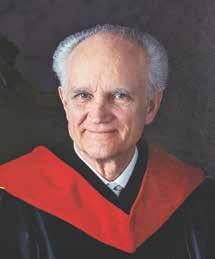
their children and grandchildren. They joined Faith Lutheran Church, and Dr. Wilch continued to serve as an elder, conducting visitations, holding services in nursing homes, fostering Bible studies, and opening his home for fellowship.
Dr. Wilch leaves behind his beloved wife Ruth; children Rev. Gerhard (Tingyu) and Anastasia (Rev. Wayne) Zhang; grandsons Nicholas, Immanuel, and Jonathan; brother Rev. George (Jan); as well as nephews and nieces.
A funeral for Dr. Wilch was held at Faith Lutheran Church in Surrey, B.C. on December 12.
by Ted Giese
Gladiator II is set about around the year 200 A.D., around twenty years after the events of 2000’s Gladiator . Director Ridley Scott again gives audiences a man with a secret past and a dead wife travelling on a grief-stricken path of vengeance that leads him through the Colosseum’s harrowing gladiatorial dangers to the equally hazardous halls of political intrigue and power within the Roman Empire.
In the first film’s conclusion, the gladiator Maximus—a demoted Roman General of the murdered Emperor Marcus Aurelius— kills the ruling Roman Emperor Commodus, Aurelius’ deranged and psychopathic son in the Colosseum. Maximus also dies from his wounds. Commodus is survived by his sister Lucilla and nephew Lucius. Gladiator concludes with a glimmer of hope that Marcus Aurelius’ desire to hand the empire back to the Roman senate might be fulfilled. In the afterlife, Maximus is happily reunited with his family who had been murdered under the orders of Commodus near the beginning of the film. Ultimately, his love for his wife and dead son, who was around the same age as Lucius, is the driving force for the loyal and principled hero Maximus to face off against the duplicitous villain Commodus.

While the original Gladiator film implies that Maximus and Lucilla had romantic feelings for each other in the past, it also implies that nothing came of it. The fact that Maximus’ dead son is around the same age as the widow Lucilla’s son Lucius only heightens the drama adding to the plot a melancholic layer of what could have been. Gladiator II , however, retcons these events. Lucilla now reveals that her now adult son Lucius is the product of an adulterous sexual relationship between her and Maximus. This change turns Maximus from a noble, virtuous, grieving hero into a philandering adulterer too self-centered to realize that Lucius is his own flesh and blood. Scott cuts the legs out from under the character, making him morally weak, tarnishing his heroism.
The Sixth Commandment: You shall not commit adultery. What does this mean? ‘We should fear and love God so that we lead a sexually pure and decent life in what we say and do, and husband and wife love and honour each other.’
Scott follows a similar storyline in Gladiator II. Lucius, like Maximus before him, arrives in Rome without everyone knowing who he is. While fighting as a gladiator of Macrinus, he becomes embroiled in drama centred on the unpopular co-Emperors Geta and Caracalla. Unlike Maximus’ owner/ manager Proximo, who had won his freedom fighting in the Coloseum, Lucius’ owner/manager is the ambitious nouveau riche Macrinus—a former slave of Aurelius who has risen to high status and wishes to take the Roman Empire for himself by overthrowing Geta and Caracalla. Ultimately, following the deaths of the co-emperors at the hand of Macrinus, Scott’s film concludes with Lucius and Macrinus engaged in hand-to-hand combat, not in the Colosseum like Maximus and Commodus, but by a bridge over the river Tiber outside the city.
While many of these characters, apart from Maximus, are dawn from real people, none of these events took place as Scott depicts them. Gladiator II is filled with many visually “cool” things—like a gladiator mounted on an armoured battle rhino and sharks attacking gladiators in staged naval battles in the Colosseum. And while these events may partly resemble real-life events, the film isn’t interested in telling actual history. They’re utilized merely because they make for cool imagery on the screen. For audiences seeking a sword-and-sandal popcorn flick, Gladiator II will easily fit the bill. Unfortunately, while Scott took liberties with history in Gladiator, he has taken even more liberties with Gladiator II.
It is good for Christian audiences to remember that, during the first century A.D.—well before the events of this film’s historical context—both St. Peter and St. Paul, along with many other Christians, were martyred
Scott cuts the legs out from under the character, making him morally weak, tarnishing his heroism.
in Rome, some under the watchful eyes of pagan spectators. While Scott is not obliged to include every aspect of Roman history in his film, there’s surprisingly little reference to Christians in Gladiator II even though Christianity was on the rise in the Roman Empire around the year 200. Historically significant men like Justin Martyr and Polycarp had already left a mark on the empire’s growing Christian population. But Scott only includes one dismissive comment about Christians. One emperor suggests crucifying someone, to which Macrinus responds: “Crucifixions are for thieves and Christians.” Christian viewers will also want to contemplate what they believe concerning the afterlife. Scott presents a thoroughly pagan depiction of the afterlife, complete with visions of the dark boatmen who ferry souls across the river Styx to their final abode in Hades. Jesus in the Revelation to St. John, says of Himself: “Fear not, I am the first and the last, and the living one. I died, and behold I am alive forevermore, and I have the keys of Death and Hades” (Revelation 1:17–18). By the year 200, there was a growing Christian response to the pagan conception of the afterlife—Christian teaching which stressed that the dead were still awaiting the final Judgement of Christ Jesus. Gladiator II is a prime example of why audiences need to remember not to get their history from historical Hollywood epics. Sometimes directors are clearly not that interested in accurately portraying recorded history. Viewers on the fence about Scott’s Gladiator II and looking for a nostalgic experience may be better served by revisiting Gladiator which is certainly the sharper, more charming, and virtuous of the two films.
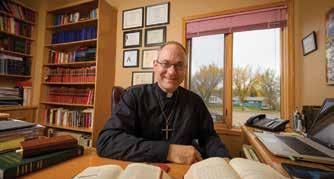
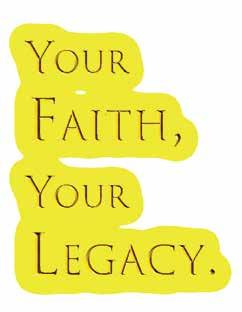
As stewards of God’s gifts, what legacy will you leave? A legacy gift in your Will ensures the blessings God has entrusted to you continue to serve His Church and spread the Gospel.
For a free seminar on Christian Estate Planning, contact:

Rev. Dr. Edwin Lehman, LCC Synodical President Emeritus (Edmonton, AB), called to glory.
Rev. Sanford Schelp, Emeritus (Surrey, BC) called to glory.
Rev. Dr. Harold Ruf, ABC District President Emeritus (Calgary, AB) called to glory.
Rev. Wayne Lunderby serving St. Paul’s (Chilliwack, BC) to Emeritus (Chilliwack, BC).
Rev. Kenneth Voege serving Our Saviour (London, ON) to Emeritus (London, ON).
Rev. Daniel Barr serving Redeemer (Kakabeka Falls, ON) to Candidate (Saskatchewan).
Rev. Andrew McDonald serving Lord of Life (Kamloops, BC) accepted a call to Shepherd of the Valley (Salmon Arm, BC) in addition to his current call.
Rev. Harald Schoubye serving Holy Cross (Winnipeg, MB) to Emeritus (Winnipeg, MB).
Rev. Keith Hoveland serving Zion (Golden Spike, AB) to Emeritus (Golden Spike, AB).
Rev. Michael Kuhn serving Lutheran Bible Translators (Cameroon, Africa) to Candidate (AB).
Rev. Rodney Parker serving Grace (Saskatoon, SK) to Candidate (SK).
Dcn. Tingyu Wilch serving Faith (Surrey, BC) to North Wisconsin District LCMS.
Rev. Fred Albert serving St. Peter's (Leduc, AB) to Candidate (AB).
Peace Lutheran Church (Taber, AB) has disbanded.
Rev. Andreas Kahle serving Peace/Duchess (Taber/Duchess, AB) to Duchess, (Duchess, AB).
Rev. Malkaa Gemechu of Edmonton, AB has successfully completed the requirements of the Pastoral Colloquy Program for Lutheran Church–Canada and is, therefore, eligible to receive a call in LCC.
Rev. Noel Richards of St. Catharines, ON and Rev. Lemi Eba of Edmonton, AB have submitted applications to the Pastoral Colloquy Program of Lutheran Church–Canada (LCC). Communications regarding these applications should be submitted in writing within four weeks to Rev. Michael Schutz, Chair, LCC Pastoral Colloquy Committee, c/o 2800 South Main Street, Penticton, BC or by email to vicepresident@ lutheranchurch.ca.
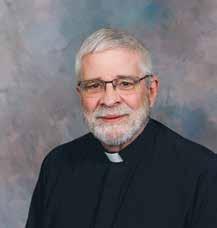
“ And going into the house, they saw the Child with Mary His mother, and they fell down and worshiped Him. Then, opening their treasures, they offered Him gifts, gold and frankincense and myrrh” (Matthew 2:11). The season of Epiphany, which recently ended, began in this way: with the visit of the magi or wisemen to the infant Jesus. In this familiar account we are given a fitting picture concerning the stewardship of our earthly treasures—whether it be gold, frankincense, and myrrh, or loonies and toonies.
Now, we don’t know much about these strange men who, following a brief stop in Jerusalem, suddenly appeared at the door of a house in Bethlehem after Jesus is born—and then just as suddenly disappear from the pages of the Scriptures. We are, however, left with one very clear image. Namely, these wisemen from the east, whoever they were, brought gifts as an expression of their worship of the Christ Child. That, after all, is the reason they made that long journey to Bethlehem. Remember what they said to Herod? “Where is He who has been born king of the Jews? For we saw His star when it rose and have come to worship Him” (Matthew 2:2). With extravagant generosity, they give us a clear example of a central aspect of our life of worship before the Lord. To a king to whom they had no claim on, being Gentiles and not Jews… to a king who didn’t look much like a king, lying in the lap of a poor, young Jewish mother in a rented room in a little village in some backwater province of the Roman Empire… to this king they bring the best of what they have. Wealth, worship, witness, and a foreshadowing of woe is what they give.
And the myrrh? That was an expensive oily resin used for burial—foreshadowing what this newborn king would do for them and for us—that is, give His life as a ransom price for the sins of the world by being enthroned upon a cross. A cross that would bear this inscription: “Jesus of Nazareth, the King of the Jews” (John 19:19). His lifeless body would then be “bound in linen cloths with the spices, as is the burial custom of the Jews” (John 19:40).
None of the wisemen’s gifts were cheap leftovers. They cost them dearly. But they didn’t see it as a hardship or an inconvenient expense. Nor did they inquire of Mary an accounting of how she intended to use their gifts prior to giving them. Rather, their gifts were an expression of their worship of the promised king of the Jews who is “King of kings and Lord of lords” (Revelation 19:18).
“As they offered gifts most rare At Thy cradle, rude and bare, So may we with holy joy, Pure and free from sin’s alloy, All our costliest treasures bring, Christ, to Thee, our heav’nly King”
— LSB 397:3 —
And do you know what? He is your king too! As such, consider the monetary gifts you bring to the King of kings as an expression of your worship. They aren’t even yours to begin with, but, rather, as the prophet Haggai writes: “The silver is Mine and the gold is Mine, declares the Lord of hosts” (Haggai 2:8). Moreover, following the example of the wisemen, our generous offerings are given first and foremost, not because our congregation or synod needs them to pay the bills, but rather from hearts that are filled with joy over what has been revealed to us in the Babe of Bethlehem who came to suffer and die as the atoning sacrifice for our sins and the sins of all people—whether they be Jewish shepherds, Gentile wisemen, or even 21st century Canadians.
Gold is the wealth… a gift fit for a king! Frankincense is the worship… the prayers of God’s people symbolized by the smoke of burning incense rising upward to heaven (Revelation 8:4). So we sing from Psalm 141 in the office of Vespers: “Let my prayer rise before You as incense, and the lifting up of my hands as the evening sacrifice” (LSB 231).
The Epiphany hymn sums it up this way: “As they offered gifts most rare At Thy cradle, rude and bare, So may we with holy joy, Pure and free from sin’s alloy, All our costliest treasures bring, Christ, to Thee, our heav’nly King” (LSB 397:3). And with the wisemen of old, let us go and do likewise.


Missouri North traces the history of Lutheran Church–Canada (LCC) from its beginnings in the mid-1800s down to the present day.
In the first half of Missouri North, noted Canadian Lutheran historian Norman J. Threinen charts the development of LCC from its origins until autonomy. The second half of the book sees LCC’s first three presidents, Edwin Lehman, Ralph Mayan, and Robert Bugbee, continue the story, recounting milestones in the history of Lutheran Church–Canada over the next three decades. David H. Somers provides an additional essay examining the unique story of LCC’s French-language ministry.



Oh,
save your people and bless your heritage! Be their shepherd and carry them forever.
— Psalm 28:9 —